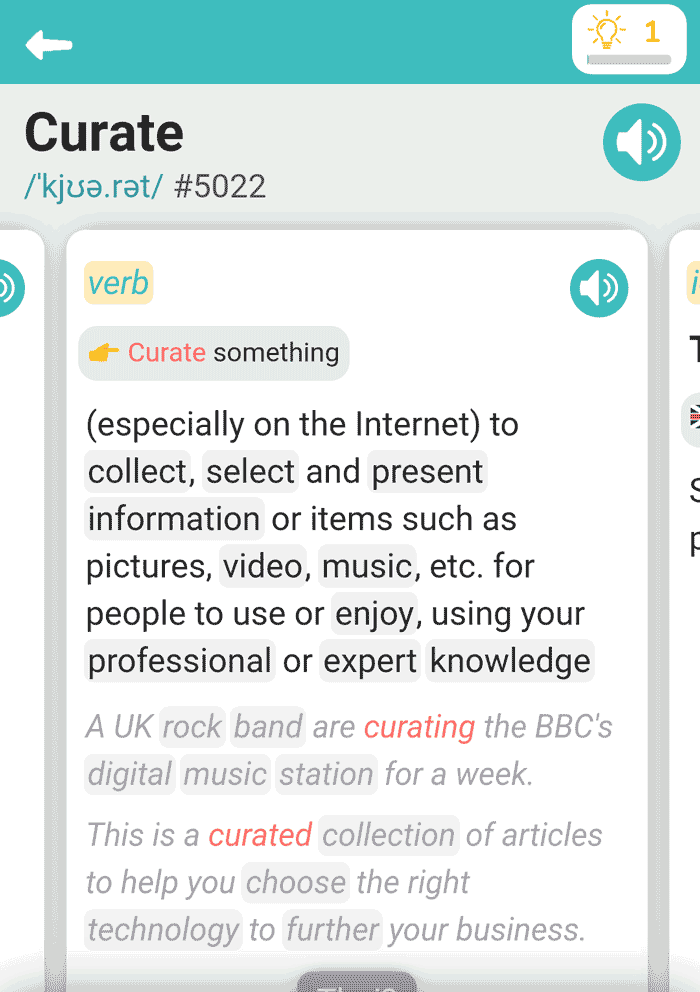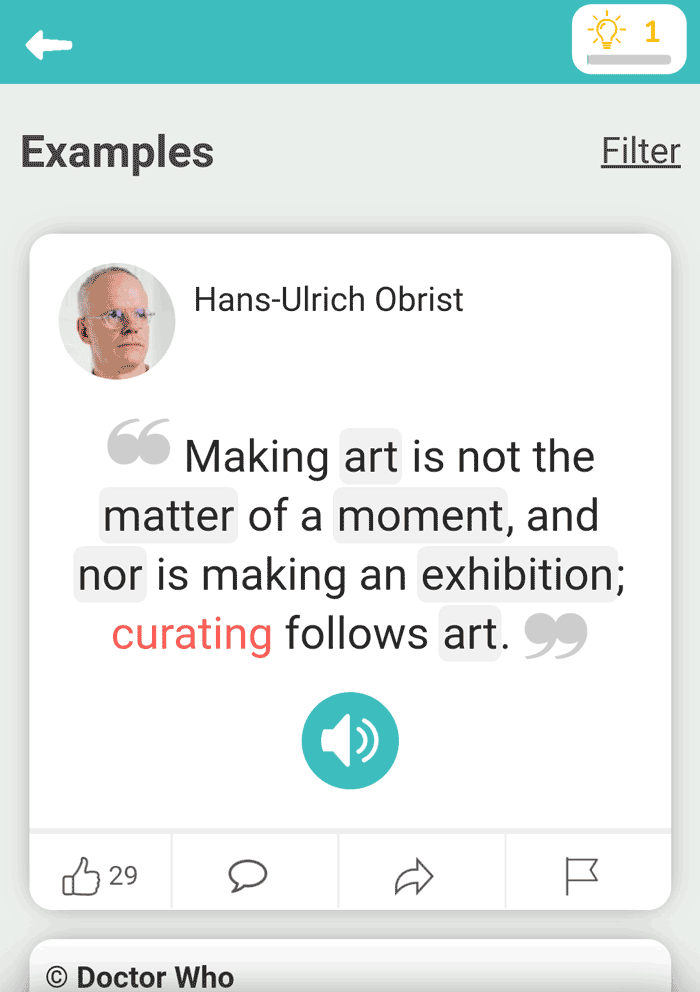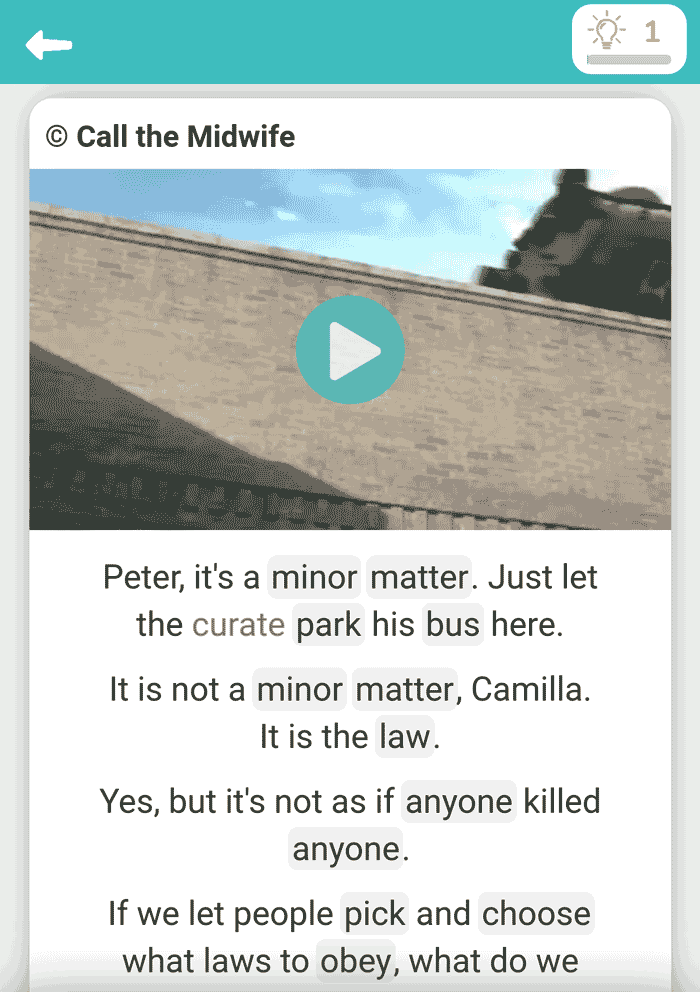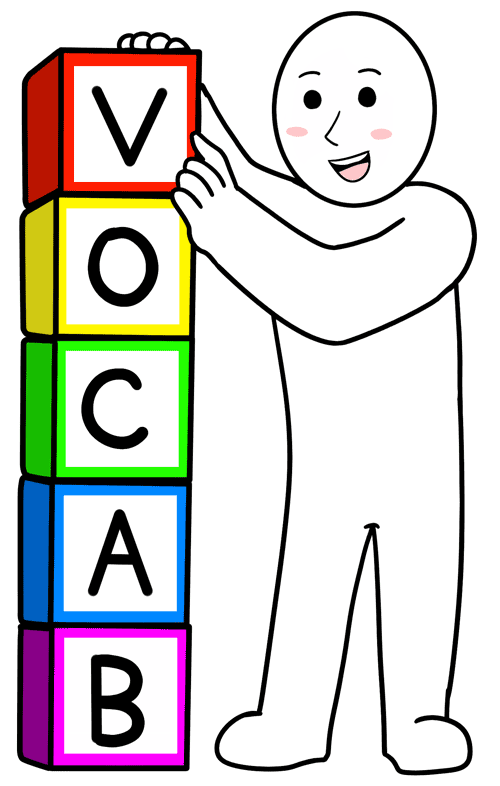
No one can deny it.
The size of your vocabulary matters.
Having a large vocabulary allows you to understand and communicate in English (almost) like a native.
So in this guide, you will learn 4 proven ways to increase your English vocabulary.
This guide will teach you:
- How to learn words deeply.
- How to increase vocabulary in a short time.
- How to expand your writing and speaking vocabulary.
- How to ensure you don’t forget words you learn.
Of course, if you want to accomplish these things, you need multiple methods.
Here are the 4 best ways to improving English vocabulary:
- Read and listen to English regularly
- Use vocabulary apps
- Imitate native speakers
- Prefer to use English over your native language
In this article, we’ll examine these strategies in great detail.
This guide is long. If you just want a summary of what to do, click here to jump to the step-by-step action plan.
Now let’s begin.
Method #1: Read and Listen to English Regularly
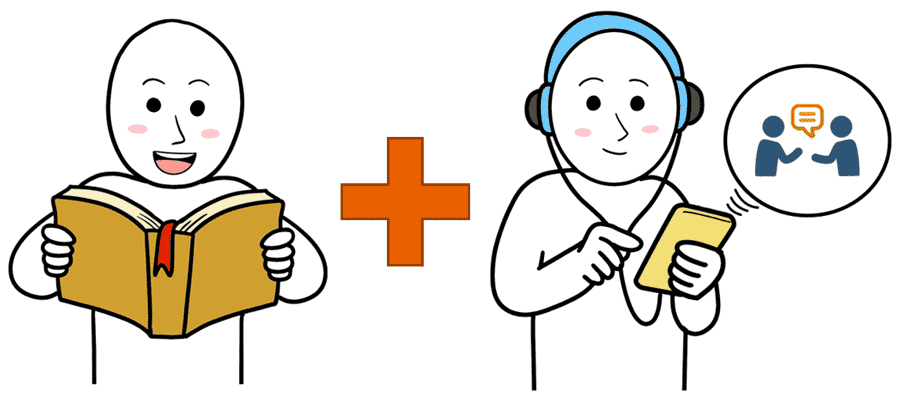
Reading and listening are the most powerful duo in English learning.
The key is to do it as much as possible. I recommend you do it during mindless activities like commuting to work or waiting at the airport. It’s a great way to turn boring activities into productive time.
You can read or listen to anything you want, but the best place is to start are things you find interesting. (For example, if you’re a fitness fanatic, you may read English books about exercise, diet, and nutrition.)
Or you can start with these two resources:
- Books to read to improve your English
- English listening materials (free download)
The Pros of Reading and Listening
Let’s look at the advantages of this method. (We’ll discuss the limitation later.)
Pro #1: It’s a powerful way to learn word usage
Some students learn English words by simply memorizing their meanings.
DISCUSS (dəˈskəs)
Talk about (something) with another person.
SECRET (ˈsēkrit, ˈsikrɪt)
Something that is kept unknown or unseen by others.
There’s a problem with this approach; it doesn’t tell you how to use words correctly in a sentence.
On the other hand, when you read or listen to English, you learn not just the meanings, but also how the words are used in a sentence.
We discussed the problem until 3 PM.
Leaning words in context (with surrounding words) like this is effective.
Suppose that presently you use the word ‘discuss’ incorrectly, so you tend to say, “discuss about (the topic),” instead of “discuss (the topic).”
How do you fix this mistake?
The answer is a lot of reading and listening. If you see and hear native speakers use the word discuss enough times, eventually you’ll get used to the correct usage, and “discuss something” will start to feel right while “discuss about something” will start to feel wrong.
Let’s look at another example.
Which of the two sentences below is correct?
- I’ll share the secrets to learn English vocabulary fast.
- I’ll share the secrets to learning English vocabulary fast.
This one confuses a lot of beginners. They tend to think the first one is correct because they believe the preposition ‘to’ cannot be followed by verb+ing.
But for advanced students who have seen and heard the word ‘secret’ in various instances, they know that the second sentence is the correct one.
Pro #2: It improves your English grammar
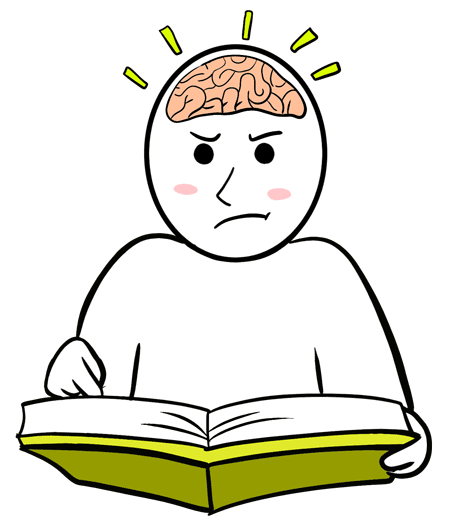
When you expose yourself to English, your brain is learning English grammar behind the scenes.
When you read a novel or listen to a story, the brain is learning things like:
- When to use certain English tenses.
- How to use prepositions (at, on, in, for, to).
English grammar is complicated and confusing, but the more you take in correct input, the better your grammar.
Pro #3: It improves your English comprehension
This one is obvious.
The more you read and listen, the better you understand written and spoken English.
Do you see why reading and listening are so powerful? They improve multiple aspects of your English at the same time.
The Limitation of Reading and Listening
When it comes to building vocabulary, reading and listening focus on quality, not quantity.
They are good at helping you learn words deeply, but not quickly.
Although they are powerful, it takes a long time to notice an improvement.
This is especially true for learners who already have a large vocabulary. Even if they read and listen a lot, they don’t come across unknown words very often.
This means if you want to learn a lot of new words in a short period of time, you need a faster approach like using vocabulary building apps.
Important Note to Advanced Learners
Although reading and listening are a slow way to build vocabulary, that doesn’t mean you shouldn’t do them.
It’s actually the opposite.
If your vocabulary level is quite advanced, listening and reading are a great way to deepen your understanding of the words you already know (so you can use them correctly in speaking and writing).
Even if you read something that contains only the words you know, it’s still beneficial because you get to see how those words are used.
Method #2: Learn English Words using Vocabulary Apps
Do you want to learn a lot of vocabulary in a short time?
Are you preparing for an upcoming English exam in which your vocabulary will be tested?
If so, say hello to vocabulary building apps.
Vocabulary apps are the most convenient way to learn English vocabulary. You can grab your phone and learn some new words almost anytime and anywhere.
Of all the vocab apps I’ve reviewed, the best one is WordUp.
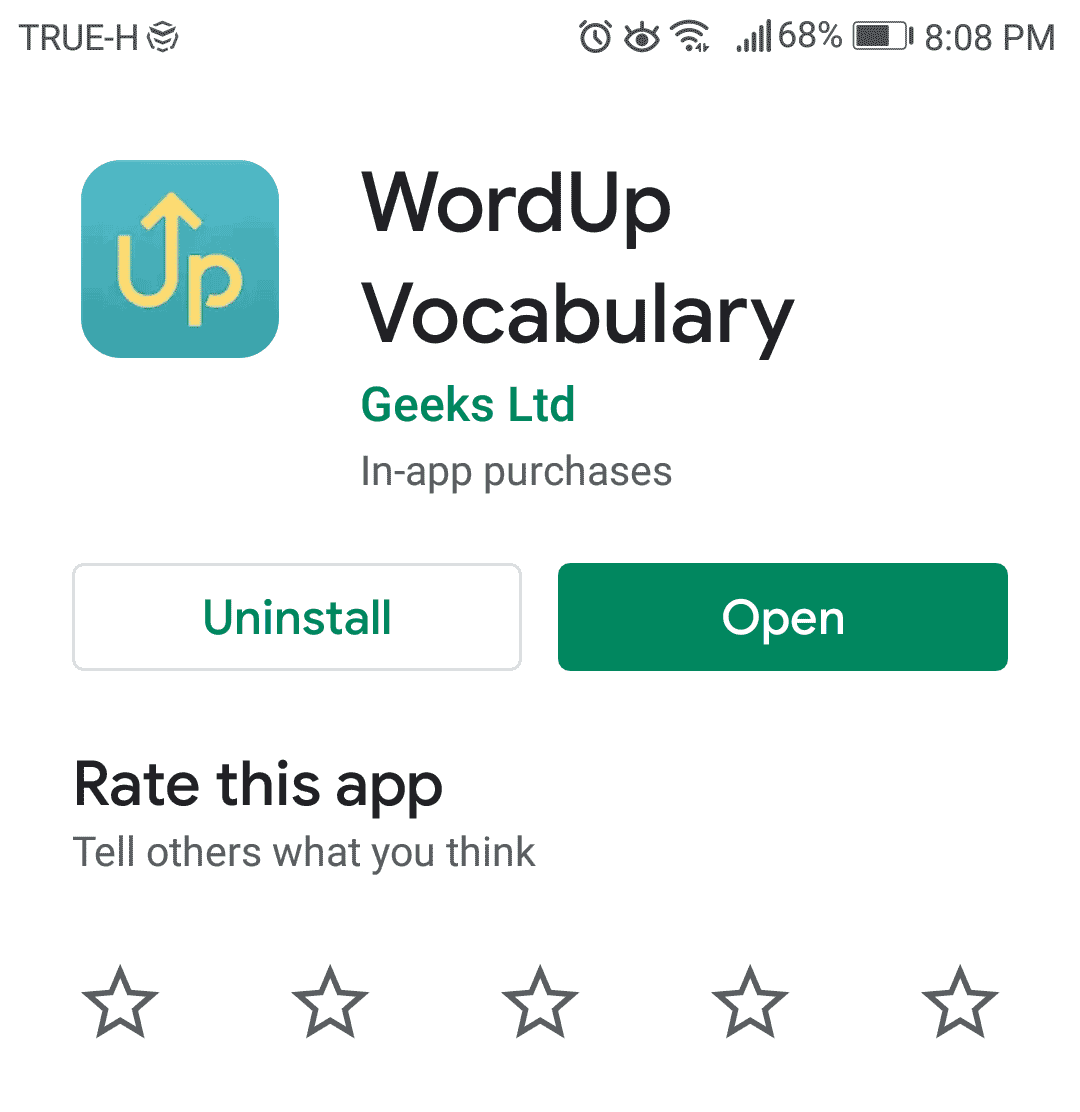
WordUp focuses on helping you learn English vocabulary deeply.
It accomplishes this by giving you a lot of usage examples.
In addition to word definitions, it shows video clips from movies and TV shows, songs, quotes, and news articles (lots of them).
Here are some screenshots:
By teaching words in context, with plenty of examples, it ensures that you’ll truly understand the words.
The app doesn’t have all the English words in the database (only the most frequently used ones). However, the number of words available is more than enough to keep you busy for a long time. Hopefully, they’ll add more words in the future.
There are many other vocabulary apps, but it’s hard to find one as good as WordUp. Some of the other apps show only one usage example for each word, or they show only one definition for multiple-meaning words.
So I only recommend WordUp for now. But feel free to try the other ones yourself.
By the way, do you want to improve your spoken English?
If so, enter your email address to join my English speaking course:
Method #3: Imitate Native Speakers
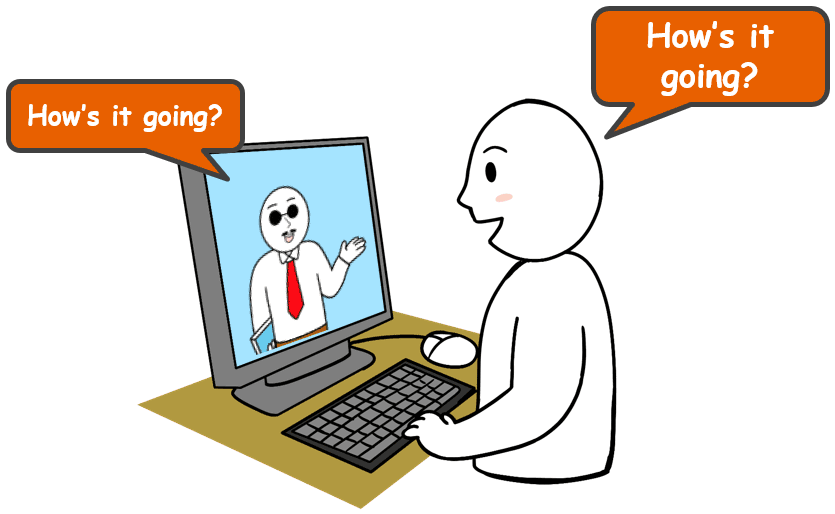
Do you understand English well but are poor at speaking and/or writing?
Do you often have trouble finding the right words to use?
If so, you have a small active vocabulary.
Active vocabulary refers to the words that you’re able to use in speaking and writing, whereas passive vocabulary are words that you know but can’t use.
How do you expand active vocabulary?
Some teachers advise that you make sentences using the words that you want to turn into active vocabulary.
So if the target word is ‘resolve’ (to decide firmly on a course of action), you may write down something like, “After being diagnosed with diabetes, she resolved to stop eating sugar.”
This is a good way to build active vocabulary, right?
But there are two problems:
- What if you unintentionally use words incorrectly? (You can’t fix mistakes if you don’t know you’re making them.)
- It’s a bit tricky to use this method to build speaking vocabulary. (You have to get three things right: the word meaning, the correct usage, and the pronunciation.)
So I’d like to offer a different approach, which is imitating (copying) native speakers.
The strength of this practice is that it ensures you’re using words exactly like native speakers do (because you’re copying them).
There are two types of active vocabulary: writing and speaking vocabulary. Let’s discuss how to improve each of them using the Imitation practice.
How to Improve Your Writing Vocabulary
Are you bored with your own writing because you keep using to same words?
If so, you’ll love this writing practice.
The idea is simple: you read the writing of a native speaker, one sentence at a time. And without looking, try to write it down from memory.
This video demonstrates the process step-by-step:
Do you have a favorite English book? Pick a chapter and start copying.
Is there an English website that you read regularly? Pick an article from the site and start practicing!
The Imitation technique is not used only by language learners; it has been used by writers as well.
Some aspiring writers will take the works of their favorite writers and imitate them. This allows them to learn the writing style (word choice, sentence structure, etc.) of those accomplished writers.
In fact, a few famous people have also used this technique to improve their writing. In his autobiography, Benjamin Franklin wrote about how he taught himself to write better by copying the writing he admired.
How to Improve Your Speaking Vocabulary
The process is similar to the writing practice.
Here are the steps:
- Find a short audio or video clip in English (2 – 10 minutes long). (There are millions of them on YouTube.)
- Listen to the entire clip.
- Make sure that you understand everything.
- The clip should contain a lot of words and phrases you’ve never used in conversation.
- Play the clip again. This time, repeat after the speaker. When the speaker finishes a sentence, pause the clip and repeat the entire sentence.
- If a sentence contains a word or phrase you’ve never spoken out loud, you should repeat that sentence many times while thinking about the meaning of that sentence.
- Once you finish imitating the entire clip (or a part of it), try to express the main points or ideas on your own.
The last step (5th one) is crucial. During this step, you will NOT be able to recall the exact words. You will forget a lot things. You will struggle to speak.
And that’s a good thing!
Why? Because research shows that “struggle” enhances learning.
You can experience it yourself. Take a look at the following words; spend the same amount of time on each column.
| Column A | Column B |
| ocean / breeze | bread / b_tter |
| leaf / tree | music / lyrics |
| sweet / sour | sh_e / sock |
| movie / actress | phone / bo_k |
| gasoline / engine | river / b_at |
| school / college | pen_cil / paper |
| fruit / vegetable | be_r / wine |
| computer / chip | television / rad_o |
| chair / couch | l_nch / dinner |
Now, without looking, open a text editor (or grab a piece of paper) and write down as many of the words as you can.
From which column did you recall more words?
If you’re like most people, you remembered more of the words in column B. In fact, studies show you probably remembered three times as many!

Why is that?
When you saw a word with a blank space, you stopped (very briefly) to figure out what it was. That tiny bit of struggle made you remember.
This phenomenon has been replicated in many studies. When learning is easy, people tend to forget what they learn. But when there’s some difficultly involved, the knowledge sticks with them long term.
So if you really want to increase your speaking vocabulary, don’t just mindlessly repeat after the speaker word for word. It’s too easy.
You must struggle!
Method #4: Prefer to Use English over Your Native Language
Your brain is efficient. It’s constantly sweeping out unused memories to make room for new and frequently-used ones.
So if you don’t recall certain information for a while, you forget it.
If you don’t perform a specific skill for a while, it gets worse.

The same goes for your English vocabulary.
Without constant exposure to the language, you forget the meanings of some words.
If you don’t speak and write in English frequently, it becomes harder to find the right words. (Imitation practice can help with this.)
This is why you should add English to your daily routine so that English vocabulary stays fresh and active in your mind.
The idea is simple. If something can be done in either your native language or in English, choose to do it in English.
For example, if you want to search for information on how to do something, search for it in English.
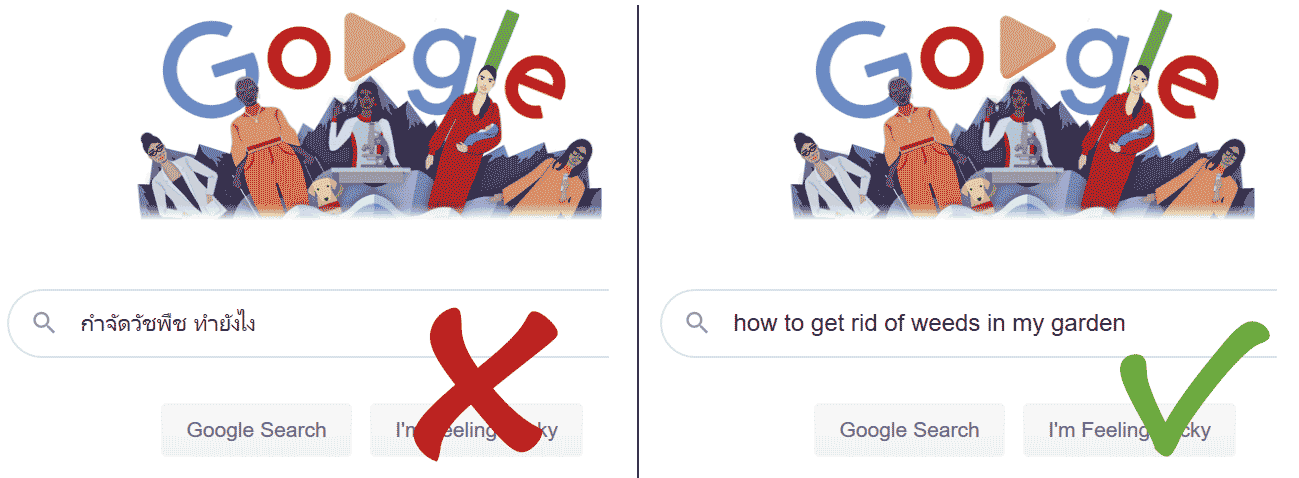
If you take a lot of notes (reminders, shopping lists), take notes in English.
If you enjoy TV shows of your native country, switch to American or British TV shows.
If you’re addicted to social media, follow English pages and groups related to your interests. (And make a lot of comments in English.)
Change the language of your phone, all the apps, and everything else you can think of to English.
Do you write a diary? Record your thoughts and feelings in English.

These are just random examples. The actual things to do “in English” depend on your routine.
So take a look at the things you do each day. Can some to them be done using the English language?
Don’t think that this is trivial. Don’t underestimate this process.
It may seem to not make much difference in the short term, but the habit of preferring to do things in English will definitely improve your English vocabulary in the years to come.
Summary: Action Plan to Improve Your English Vocabulary
As you’ve learned, there are multiple ways to build vocabulary, each has different strengths and weaknesses.
It can be confusing to figure out when to use each of these methods.
So here’s a practical, step-by-step guideline:
Step 1: read/listen to English during mindless activities
We all have nonproductive activities that take up a lot of our precious time:
- Waiting for an appointment.
- Commuting.
- Lying in bed awake, waiting to feel sleepy.
This is the best time to read or listen to something in English.
The time you spend listening/reading should be at least 5 – 10 minutes long.
It takes time to fully shift your attention to something, so if the period is too short (like 2 – 3 minutes), that’s not enough time to fully concentrate on the material.
If you try to read or listen to something for just a few minutes, it will be hard to pay attention. You may see/hear the words but your mind will be occupied with something else.
Step 2: use vocabulary apps throughout the day
Our days are filled with hundreds of little moments:
- Standing in line.
- Waiting for the elevator.
- While the coffee is brewing.
- Pooping.

These moments are very short (usually less than 5 minutes)…too short to read or listen to something in English. This is when most people browse social media or text messages.
But not you! If you want to increase your vocabulary fast, this is the time to open a vocabulary app and learn a few English words.
Each time you do this, it may not seem like much (maybe you learn only 1 – 2 words). But if you do it throughout the day, the words begin to add up!
Adopt this habit. You’ll be surprised how much English vocabulary you can learn.
Step 3: if you want to build active vocabulary, practice Imitation
As you know, nowadays it’s not enough to just “understand” English. You mush be able to communicate in English too (and do it well).
To achieve this, you need to expand your speaking and/or writing vocabulary.
So I suggest practicing the Imitation technique for at least 15 minutes a day. It’s the best way to train yourself to use new words (in the correct way).
Whether you practice writing or speaking depends on which skill is more important to you at the moment. If both are equally important, you can alternate between the two, so one day you practice speaking, the next day you practice writing, and so on.
Step 4: use English instead of your native language whenever possible
You forget things that you don’t recall or use often, so using English regularly is essential.
Do your best to use more English in your daily routine.
Do you keep track of your appointments in a calendar app? Write down the details in English.
Do you often write down a list of things to buy? Make a list in English.
Sometimes, you may not know the English word for something, that’s okay. You can use the word in your native language instead. (Or better yet, you can search for that English word online. It’s super easy. No big deal.)
And that is all you need to know about improving your English vocabulary. You can adjust my suggestions as needed to suit your goals.
Thanks for reading. I hope you found this article useful.
8 min
Created: July 13th, 2022Last updated: April 3rd, 2023
Contents
So many people chat easily in English. And then the question naturally arises, why can’t I do that? The essence of the problem lies in the fact that not every one of us has a sufficient vocabulary.
While learning English, not only the rules are important, but also the words. Without a vocabulary, all the rules and formulas for making sentences will simply be useless.
First, understand: it is impossible to remember all the words! This is not related to your laziness, these are purely physiological features of our brain. Don’t blame yourself that you have known and heard something, but forgotten. Just choose the most effective way for you, and answer how to improve your vocabulary in English.
How to Boost Your English Vocabulary
Words are an essential part of the language. If you don’t know them, you won’t be able to express one thought or understand another. To constantly improve your English level, you need practice. But after work, people don’t want to read foreign books or watch movies without translation.
And what if you spend only 15-20 minutes a day learning English? And you don’t have to force yourself, because the process is organized excitingly. You see your progress by the day, compete with other users, exercise pronunciation, and the level is growing rapidly.
All this is implemented in the Promova application, where you can increase your vocabulary by 300 words per month.
12 Ways to Expand Your Vocabulary
There are some tips to improve vocabulary:
1. Learn a few words a day.
Take a list of 15 words every day. That’s enough for a start. Say all the words loudly, clearly, and with different intonations twice in the morning and the evening. Depending on your memory, you can spend two or three days on one list.
2. Read aloud
You should always read aloud. Pronouncing a word will be easier for you to remember not only how it looks, but also how it is pronounced. In addition, you will have a much better chance that you will be able to use the word in speech and improve your vocabulary skills.
But before you learn a word, check its pronunciation. If you immediately remember its pronunciation incorrectly, you are unlikely to retrain.
3. Use household items
Any household items in the house can become your assistants. You can stick stickers with words on them. Some people think that it is ineffective or suitable only for learning banal vocabulary, but it is not. It is important not only to stick papers but also not to forget to work with them. Otherwise, after a week you will stop noticing them, and the words will not be remembered.
4. Special literature
In English, it is called the Vocabulary Resource Pack. Pay attention: these are NOT textbooks. There are many authors and publishers, but the structure of such manuals is about the same. Each has one level of difficulty; the words are collected by topic. After the explanations, several exercises for using and memorizing await you.
5. Constantly use new words in speech
The best thing is to find someone to talk to. The network is full of resources that are created for such mutual pumping of conversational skills. If you are embarrassed to talk to unfamiliar speakers, agree with a friend. 5 minutes of each conversation should be in English.
6. It is necessary to learn new vocabulary and words without taking them out of context
One word in English can have many translation options that are not related to each other in any way.
Therefore, all methodologies recommend memorizing the entire phrase, and sometimes sentences. By no means a specific word, since you can get into an awkward situation by using the wrong word.
7. Films, books and foreign songs will be a very good help to increase vocabulary
You can choose different films, for example, adapted, with or without subtitles, and the genre can be different. The more you watch, the more accents and speech styles you hear. As it turned out, there are a lot of colloquial phrases in films that you can remember and skillfully use in your speech.
Another good helper is a book. It doesn’t matter what kind of books they are, electronic or audio. By reading, you memorize words visually, as well as pronouncing them to yourself, which gives you every chance to expand your vocabulary.
Songs in English are another English vocabulary booster. They will help you develop the skill of speaking, easier assimilation, and memorization of words. Information that sounds like a «background» is sometimes absorbed even more firmly.
8. Do you think what to cook for dinner today? Look for the recipe on an English-language culinary website.
9. Change the language of the settings of your computer, mobile phone, and other gadgets to English.
10. Do you like to keep up to date with events, and read the news daily? Do not neglect English-language news portals.
If you are not familiar with the sociopolitical vocabulary, then you can first read the news in your native language, and then find the same in English. At the same time, you will learn the point of view of the bourgeois press on various events. It is very interesting and often unexpected.
11. Mind map
According to most opinions, this is the coolest way to work with words. For example, choose the theme «Kitchen». You write in the center of the paper «kitchen», and then it’s time for creativity. Draw an arrow and write «food» and everything that fits into this category: potatoes, pasta, meat, onion, cucumber, and so on. Next, you can draw an arrow with actions, for example, what you can do with food: cook, book, peel, cut, slice, blend, and so on.
12. Use visual associations
For example, you learn the names of parts of the world, countries, and capitals. Print out a large contour map and sign all the names in the language you are studying. You see the outline of the country on the map – you understand what kind of country it is – you see its name in a foreign language, as well as the name of the capital. You do not need to compare the name in your native language, you directly build an association with the country and its foreign name.
The same can be done with a calendar for studying the days of the week, months, and numbers, with a wall clock, with objects in the room.
1
Learn Even More Words with Promova
How to learn new vocabulary? Every year new language apps appear in the App Store. It remains only to decide which one is right for you. It is better, of course, to look at those that are based on a scientific methodology.
Instead of starting a diary, or setting an alarm clock, you can use a smart Promova algorithm that will adjust to you and will tell you exactly when and which words should be repeated. The creators of the application promise that if you study for only three to four minutes a day, then in a month you will master 150 new words.
And expanding vocabulary will be guaranteed for a long time.
The words in the application are divided according to the level of complexity and different categories — from travel and chemistry to thematic collections based on popular TV series.
You don’t have to painfully try to figure out which words suit your language level or independently select words on a specific topic.
Another advantage of digital cards is that they are complemented by illustrations, in combination with which words are remembered better.
Conclusion
Vocabulary expansion is one of the indicators of the level of language proficiency. The number of known words is just a number that has no particular value. It is not necessary to strive for certain figures and draw conclusions based on them. But measuring vocabulary still makes sense.
Measuring the number of familiar words will help you track your progress in English. To do this, it is important to use the same methods – for example, always the same vocabulary test. If you take the test 1-2 times a year, you can see the progress. This will help, if necessary, adjust the balance in learning, pay more attention to vocabulary, or motivate you to further improvement.
Everyone learns differently, so if you don’t know what works for you yet, try as many ways or combinations of them as possible: word cards, phone apps, word lists, games, or stickers are great ways to increase your vocabulary. The same applies to finding the right time: some people need an accurate schedule, and others learn spontaneously. But the main thing is to practice systematically. Practice makes everything perfect and possible.
FAQ
How do I remember the new words I’ve learned?
There is only one way to leave a word in memory for a long time: to constantly use it in speech. But if you do not live in a country with an English-speaking population, it is not so easy to follow this rule. Put the most difficult words at the beginning and end of the list. This is called the «edge effect». Memorizing words from the beginning and end of the list are remembered best. So write down there what you can’t master in any way.
How can I improve my English vocabulary fast?
Don’t learn English words in a vacuum. If you come across an unfamiliar word, and you decide to remember it, write down the context in which it was used. If you like a song, read its translation. Write down a quote that you particularly liked. Sing it during the next audition. Also improve your vocabulary with movies, music videos, and books.
There is no single indicator of whom, how and in what time should remember words. If suddenly something did not work out the first time, do not scold and do not blame yourself for it. Just go from the other side, look at the situation from a different angle, and in no case compare yourself with others. Everyone has an individual pace of learning a foreign language.
How do you learn new words daily?
Every day we have to assimilate and memorize large amounts of information. The process of memorizing is time-consuming, but properly selected methods will help to cope with this task. The main thing is to overcome laziness and find an interesting approach for you. Then memorizing words will not be a daily routine. Divide words into semantic blocks. Do not learn words out of context — immediately use them in speech. Periodically return to the studied material. Learn words piecemeal and don’t try to memorize everything at once. And be sure to combine memorization techniques. In order not to overload the memory, we advise you not to chase a lot of words. If you plan to study daily or at least every other day, 15 words will be enough.
Which app is best for learning English vocabulary?
If you are interested in services that help you memorize English words, we recommend Promova. Thanks to this resource, you will understand how it is easier to remember English words.
Promova will help you memorize new words every day and return to them at increasing intervals. The program will remind you when you need to repeat the words, in the specified order and with the desired frequency.
Learning a foreign language isn’t always easy, especially when it comes to vocabulary. (I’ve been studying Japanese for years and still have trouble remembering words!) Luckily, there are many ways you can learn English vocabulary—and some of them are even a little fun!
In this guide, we go over the top five methods you can use to learn English words and give you a few tips on how to find English words to study.
Feature image: Nicolas Raymond/freestock.ca
Method 1: Make Flashcards
One of the most popular (and arguably best) ways to learn English vocabulary is to use flashcards. Each flashcard will have one English word written on the front and the word’s translation or definition on the back.
To study them, you’ll look at one side of a card and say the word on it in the opposite language before you look at the other side of the card (so if you were looking at the English side, for example, you’d say the word in your native language).
Flashcards are excellent resources because they help you memorize vocabulary words both quickly and effectively. They’re also customizable and reusable. Both paper and digital cards are available, and you can make your own cards, buy a pre-made deck, or download a deck online.
Pros
- Flashcards are easy to make. If you’re making paper cards, all you need are note cards (or small pieces of paper), a pencil or pen, and a list of the words you want to study. For digital cards, all you need is a computer and some software or a website to make them with.
- They’re interactive, especially if you make them yourself. With paper flashcards, you must write down all of the words you want to study as well as physically thumb through the cards, helping you concentrate on what each word means.
- Flashcard decks are easy to expand if you find new vocabulary you want to study. All you need to do is make a new flashcard and then add it to your deck—that’s it!
- They’re easy to randomize. Mixing up the order in which you study is essential to ensuring that you fully understand the meanings of the words you’re learning.
Cons
- Making flashcards is time consuming. Though not particularly difficult to make, flashcards can take a long time to create (regardless of whether you’re making paper or digital cards). Therefore, make sure you have ample time to set aside when making them.
- Paper flashcards are bulky and take up a lot of space. As a result, they’re often difficult to take places and use for on-the-go reviewing. If you’re hoping to brush up on your English vocabulary at places other than home, consider bringing only some of your cards with you or using a more compact resource such as a list (see method 2 below).
How to Use This Method Effectively
Flashcards must be used in specific ways in order to be effective for English-language learning. These methods differ depending on whether you’re studying with paper or digital flashcards.
Paper Flashcards
Paper flashcards are best for those who prefer more traditional study methods and want a break from computers and smartphones.
You can use any blank note cards to make your flashcards. Once you have some, start making your cards: with each card, write an English word (spelled correctly!) on the front and its translation in your native language (or an image of the word) on the back. You may also include on the front the word’s part of speech and/or a sample English sentence.
When finished, begin studying your flashcards using the «waterfall» method. With this method, you’ll study cards in subsets (smaller stacks of cards) and get to review harder English words more often than words you already know.
We explain the waterfall method in more detail in our guide to TOEFL vocabulary flashcards. However, to summarize briefly, here’s how it works:
#1: Go through all of your flashcards and make two piles: a «Know It» pile (with words you know) and a «Struggled» pile (with words you don’t know). Put the «Struggled» pile to the right of the «Know It» pile:
#2: Next, go through the cards in your «Struggled» pile one at a time. As you do this, make a second «Know It» pile for words you know (put this pile to the right of your original «Know It» pile). For words you don’t know, put them back in your «Struggled» pile.
#3: Continue this process of going through your «Struggled» pile and making new «Know It» piles until you only have four to five cards left in your «Struggled» pile. Here’s what your cards should look like:
#4: Now, work your way back up your «waterfall» of cards, starting with your «Struggled» pile. Go through this stack of cards until you know all of the words in it. You might have to go through it several times before you can remember all of the words.
#5: Combine the «Struggled» pile with the «Know It» pile directly to the left of it. Now, you’ll go through all of the words in both piles (combined as one) until you know all of these words.
#6: Repeat step 5 until you’ve gone through all of the cards in your deck, from right to left. You should now know the meanings of all of the English words on your flashcards!
Digital Flashcards
Some people (myself included!) prefer studying foreign languages with digital, or computerized, flashcards. These types of flashcards are accessible through software applications, websites, and/or apps.
While there are many free flashcard-making websites and programs available, my personal favorites are Anki and Memrise.
Anki is a free downloadable software through which you can make your own flashcards or download pre-made decks submitted by users. It uses spaced-repetition software (SRS) to show you difficult cards more often—similar to the waterfall method described above—making it convenient and easy to use.
Memrise, on the other hand, is a free language-learning website that offers tons of pre-made decks. It’s a little flashier and more game-like than Anki, so if you’d prefer a more «fun» way to learn English words, this is a great website (and app!) to try out.
Method 2: Make a Study List
Another helpful method is to make a list of all of the English-vocabulary words you want to learn. A list is different from flashcards in that it has all of the words you need to know in one place (instead of on separate cards). If you don’t want to deal with the hassle of using note cards, a study list is a solid option.
Pros
- The biggest benefit is that lists are easy to expand as you come across new words you want to know. For example, if you saw an English word you didn’t know on a sign at a restaurant, you can simply take out your list and write it down.
- You can use your list as a base for other study methods. Lists are helpful resources for identifying specific words to put on flashcards and use in vocabulary quizzes (see method 4).
- A list is less bulky than flashcards. With a list, you can keep track of dozens of words on a single sheet of paper, taking up far less space than hundreds of flashcards.
- It’s easy to make. All you need to do is write out each word, its part of speech (optional), and its meaning in your native language—nothing more!
Cons
- They’re pretty tedious and boring to work with. Unlike flashcards, which are highly interactive (you can make cards, flip through them, shuffle them, etc.), lists are static resources with few stimulating features.
- They make it difficult to randomize words. You’ll learn English words faster by sporadically mixing up the order in which you study them, but it’s a challenge to randomize words on lists since you can’t physically rearrange them as you can with flashcards.
How to Use This Method Effectively
Write your English words on the left side of a piece of paper, from top to bottom. I suggest numbering the words and adding their parts of speech, too (this is helpful because it teaches you how to use the words).
Then, on the right side of the paper, write the translation of each word in your native language (again, from top to bottom so that each translation aligns horizontally with its English equivalent). Here’s an example:
When you’re ready to start studying, get a separate sheet of paper (or your hand) to cover up the words on the right. You’ll then move this sheet down as you read and define each English word on the left. Make sure to say each word aloud in English before translating it into your native language.
Once you’ve defined a word, move your sheet of paper down to check that you’ve translated it correctly:
As you go through your list, consider marking any words you’re having trouble remembering. This way you’ll know right away which words you need to spend a little more time on than others.
Here are some additional ways you can use your list to learn English vocabulary:
- Study words in reverse. With this method, you’ll start at the bottom of your list and reveal words one at a time by moving your sheet up instead of down. This prevents you from simply memorizing the list in one particular order.
- Cover up the English side so that you must read the words in your native language and then translate them into English. Studying like this ensures you can come up with English equivalents for words all on your own.
These are both great methods to use after you’ve used the main method described above and are more familiar with the English vocabulary on your list.
Method 3: Write Out Words Repeatedly
If you want to practice spelling English words and like doing something physical as you study, writing out words is a solid option to try. With this method, you’ll write out each English word several times as you say it aloud.
If you’ve taken English courses in the past, you’ve probably had homework similar to this (I had to write out new words all the time for Japanese class in junior high and high school!). Although rote memorization isn’t everyone’s cup of tea, it can still be a highly effective way to learn English words.
Pros
- It’s interactive. Unlike flashcards and lists, which you merely look at to study, you’re always doing something when writing out words. If you’re the type who gets easily antsy and likes having something to do with your hands as you study, this is a good method to try.
- It helps you remember how to spell words. Flashcards and lists mainly teach you what a word means, but writing out a word (rather than looking at it briefly) makes it far easier to remember how it’s spelled.
Cons
- Writing out words repeatedly can feel monotonous. Despite being an effective method, rote memorization isn’t a particularly fun way to learn a language and gets tiresome fast.
- You can easily lose focus on a word as you write it again and again. To truly benefit from this method, you need to focus on what each word means and how it’s spelled. Unfortunately, the repetitive motions make it easy to fall into a zombie-like stupor.
How to Use This Method Effectively
The best way to write out words is to have a set number of times you’re going to write them out. Usually, 10 to 20 times is sufficient. Just make sure you’re actively thinking about each word as you write it out: look at the letters and how they’re arranged, pronounce it, and then define it.
I find that it’s helpful to note the translation of each word (in your native language) above your repetitions so that you don’t forget the meanings of any words and can more readily make associations between words in your language and in English.
Finally, I strongly suggest using this method with one of the two methods above (flashcards or a study list) to keep you from getting bored with your studies. Personally, I think the flashcard method is better as it’s more fun and doesn’t require you to make another long list of words.
Method 4: Take Vocabulary Quizzes
If you’re tired of flashcards and lists, vocabulary quizzes are a great way to test what you’ve learned and ensure you truly understand the meanings of English words.
Many English-word quizzes are available for free online. While some are traditional tests, others are more game-like; for example, you might find a matching game in which you have to match English words with their meanings (also in English!).
You can also make your own vocabulary quizzes using any of the resources above (flashcards, lists, etc.).
Pros
- They check your English progress by testing what you’ve learned. Quizzes let you see whether you truly know the English words you’ve studied and can use them fluently. If you fail a quiz, you’ll know exactly which words to work on more.
- Most online vocabulary quizzes are free. You can find tons of free, high-quality English-language quizzes and games on websites geared toward students, ESL learners, and general language learners.
Cons
- You can’t really learn words from scratch using quizzes alone. In other words, you’ll need to combine quizzes with one or more of the methods above so you can learn English vocabulary before testing out what you know.
- Some online vocabulary quizzes aren’t super high quality, so make sure you’re choosing ones that have words you are familiar with and no glitches or inaccuracies.
How to Use This Method Effectively
You have two options when it comes to English-vocabulary quizzes: look for pre-made quizzes online, or make your own.
Online Quizzes
If looking for quizzes online, I recommend starting with popular learning websites.
One option is Free Rice, whose «English Vocabulary» mode tests your knowledge of various high-level English words. Each question gives you one English word and four possible synonyms; the answer choices are also in English, so you’ll need to have a high English level in order to do well. For each question you get right, Free Rice donates 10 grains of rice to help end world hunger. So this is an excellent resource to use if you like the idea of helping others as you study!
Quizlet and Cram are two other websites you can use for free. Both offer flashcards, vocabulary lists, quizzes, and games. All you do is choose an English-vocabulary deck (or make your own) and then test yourself using the site’s «Test» feature.
Both websites’ «Test» features are similar to an actual language test: you get a variety of question types, from fill-in-the-blank and matching to multiple choice and true or false. With Cram, however, you can also choose how the system grades your answers. For example, you can make it so you don’t lose any points for errors in punctuation or capitalization.
Making Your Own Quizzes
The best way to make your own English-vocabulary quiz is to use flashcards (see method 1). With flashcards, you can easily randomize the words you’ll get and can’t predict which words will come up.
To make a quiz, get out a sheet of paper and number it 1-20 (or however many questions you want to have). Then, choose a flashcard at random. On your paper, write down the English word shown and (without flipping the card over) its translation or meaning in your native language.
Don’t check your answers right away by flipping the cards over—rather, wait until you’ve finished your entire quiz and then flip over the flashcards to score your test.
Method 5: Use Vocabulary Words in Conversation and Writing
Although the methods above are extremely useful for memorizing English words, you’ll never retain the words you learn unless you actually use them in conversation and writing. In short, context is key!
Pros
- You’ll learn more quickly how to use and say words you’ve studied. Although you should always say words aloud when you first learn them, using them in conversation (especially with native English speakers) is by far the best way to ensure you’re actually pronouncing and using them correctly.
- You’ll remember words better by using them in sentences, so always look for opportunities to use words you learn in both conversation and writing.
- You can get feedback when conversing with or writing to native English speakers. If you’re not sure whether you’re using a word correctly, you can ask others to give you feedback or explain how they themselves use specific words in English.
Cons
- It’s not always easy to find people to use English with. If you don’t live in an English-speaking country, native speakers can be hard to find, making it difficult to actively use the words you learn in conversation and writing.
- You need someone to check that you’re using the words correctly. If you’re using a word in writing, for example, but aren’t sure whether you’re using it correctly, you’ll need to ask a native speaker to check it for you. This can be tough to do, though, if you don’t have access to any native speakers.
- It can be intimidating to use new words with others. When speaking another language, we tend to rely on using only the words we know so we can avoid making any obvious mistakes. Unfortunately, this fear can ultimately hinder your ability to learn new words and use them with confidence.
How to Use This Method Effectively
If you’d like to use new English words in conversation, you’ll first need to find native English speakers or other English-language learners to practice speaking with. If you don’t live in an English-speaking country, try looking for English-language groups or clubs you can join in your area. Meetup, for example, is a handy website you can use to search for language groups around you (you can even create one yourself!).
Another option for English-speaking practice is to pay for video chat language lessons. Fees vary depending on the company you use and how many hours you want to practice. Some of the best websites to try include Live Lingua, Verbalplanet, and italki.
But what about writing in English? If you want to practice using words in writing, start keeping a journal and then have other people (preferably native English speakers) read your work to check that you’re correctly using new vocabulary.
My personal recommendation is a free website called Lang-8 on which you write various posts (such as journal entries, questions, stories, etc.) in your target language. Once you make a post, native English speakers then correct your entries and offer feedback. I’ve used this website many times before while studying Japanese, and it’s always been an extremely helpful resource!
You can also find a pen pal to write to in English—ideally, one who is a native English speaker and will write to you in your native language in return. This way you can have someone you know correct your English as you also correct his or her writing in your language!
How to Find English Vocabulary to Study: 3 Options
Now that we’ve given you a handful of methods you can use for learning English vocabulary, here are a few tips on where to actually find new English words to study.
#1: Write Down Words You Hear and Read
This is perhaps one of the most practical methods for learning English vocabulary, and one I often used while living in Japan. Basically, you’ll keep a running list of any unfamiliar English words you hear or read in both your day-to-day life and studies.
For listening, some of the best resources to use for finding new words are as follows:
- Everyday conversation: Ideally, you’ll converse mostly with native English speakers; that said, it’s better to practice speaking with other English-language learners than with nobody at all!
- English movies and TV shows: Avoid turning on the subtitles for your native language. Instead, if you’re having trouble picking out key words, turn on the English subtitles; this will help you identify new words more quickly and let you see how they’re spelled.
- English podcasts: Start by browsing this excellent list of English podcasts for language learners. Then, find the ones that sound most interesting to you and start listening!
- YouTube: Find English videos on topics you’re interested in (and turn on English subtitles if needed).
For reading, try looking for new English words to practice in these resources:
- Newspapers: There are tons of high-quality English-language newspapers online. Intermediate speakers can start with easier English-news websites such as VOA Learning English and BBC Learning English, whereas advanced learners can dive right into popular news outlets such as CNN and The New York Times.
- Websites: Look for websites and blogs dealing with any topic of interest to you. I suggest looking for prominent websites with lots of followers to ensure that the English they use is high quality.
- Books and stories: What better way to learn new words than through your favorite fairy tales? Intermediate learners can start with children’s books and short stories, while advanced learners can jump to novellas and novels. Graphic novels are also excellent resources!
Once you’ve found vocabulary words you want to study, open a Word document on your computer and start making a list. You can then add words to this list whenever you come across ones you don’t know in your listening and reading practice.
Make sure to include most or all of the following elements on your vocabulary list:
- The word in English (spelled correctly!)
- Its part of speech
- The translation/meaning of the word in your native language
- An example sentence using the word
You can then use this list as your primary study list or to help you make flashcards and quizzes.
#2: Look for Free Word Lists Online
Another helpful option is to seek out pre-made English word lists. Waiting to hear or read new English vocabulary isn’t always practical for language learners, but you can luckily find many free English-word lists online using the websites mentioned above (e.g., Quizlet, Cram, Memrise, etc.).
If you want to study upper-level academic vocabulary, try looking specifically for vocabulary lists targeting popular college-admission tests, such as the TOEFL, GRE, SAT, and ACT. At PrepScholar, we’ve gathered all high-frequency words for these exams and even created free downloadable flashcards for the TOEFL and GRE.
#3: Use a Textbook
If you like having structure in your vocabulary studies, consider buying an English-language textbook or workbook. These books should give you plenty of new vocabulary words to study as well as lots of relevant exercises to help you memorize and retain them. Oftentimes, textbooks come with a built-in dictionary, too!
Make sure you’re choosing a book that’s highly reviewed and geared toward your English level. You can also try looking at books that specifically target the TOEFL. Unfortunately, English-language textbooks cater mostly to beginner and intermediate learners, so if you’re an advanced English speaker, you’ll likely benefit more from the two options above.
There are many different ways to learn English vocabulary, from rote memorization and repetition to flashcards and quizzes. But in the end, it’s up to you to figure out which methods will work best for your learning style.
Here are some final pieces of advice to remember when studying English vocabulary:
- Don’t try to memorize every single word. English is believed to have the most words of any language, and I guarantee you won’t be able to learn all of them (even native English speakers don’t know every word!). Therefore, focus on memorizing the words you encounter most often. For everything else, use a dictionary!
- Ask for help if you get stuck. If you can’t remember the meaning of a particular word and don’t have a dictionary on hand, don’t be afraid to ask someone to define it for you. There’s nothing wrong with asking for help, and it’s certainly nothing to feel embarrassed about!
- Make studying English a habit. For a lot of people, it can be hard to find time to study English. But you’ll need a routine if you want to learn English words and actually remember them, so try to set aside at least 30 minutes every day to go through your study materials.
Good luck with your English studies!
What’s Next?
Need English-vocabulary words to study? Take a look at our list of 300+ high-frequency TOEFL words today! We also have created a free TOEFL vocabulary flashcards PDF here.
Want more tips on how to learn English? Start with our guide to learning English and figuring out your language goals. Then, move on to our article on the best English-language games you can play, with others or by yourself!
Planning to take the TOEFL? Then you’ll definitely want to read our expert tips on how to prepare for this tricky English test.
Taking the TOEFL and need to boost your score? We have the world’s leading TOEFL course.
Built by world-class instructors from Harvard and MIT, our TOEFL course offers individual review, interactive lessons, and realistic online practice, at an affordable price! It’s the fastest way to get your target TOEFL score. And the best part? You can try it out for 5 days absolutely free of charge!
Have friends who also need help with test prep? Share this article!
About the Author
Hannah received her MA in Japanese Studies from the University of Michigan and holds a bachelor’s degree from the University of Southern California. From 2013 to 2015, she taught English in Japan via the JET Program. She is passionate about education, writing, and travel.
There are many ways to improve your vocabulary. When working to do so, it’s important to know your goals in order to best choose the way in which you want to learn. For instance, reading can be a great way to improve your vocabulary, but it won’t be much help on a vocabulary test next week. Here are a number of methods to help you improve and expand your English vocabulary.
Synonyms and Antonyms
A synonym is a word that has a similar meaning. An antonym is a word that has the opposite meaning. When learning new vocabulary, try to find at least two synonyms and two antonyms for each word. This is especially important when learning adjectives or adverbs.
Use a Thesaurus
A thesaurus is a reference book that provides synonyms and antonyms. Used by writers to help find just the right word, a thesaurus can also help English learners expand their vocabulary. You can use an online thesaurus which makes finding a synonym easier than ever.
Vocabulary Trees
Vocabulary trees help provide context. Once you’ve mapped out a few vocabulary trees, you’ll discover yourself thinking in vocabulary groups. When you see a cup your mind will quickly relate such words as knife, fork, plate, dishes, etc.
Create Vocabulary Themes
Create a list of vocabulary themes and include a definition and an example sentence for each new item. Learning by theme emphasizes words that are related. This will help you memorize new vocabulary because of the connections between these words and your chosen theme.
Use Technology to Help You
Watching movies or sitcoms is a great way to help you understand native speakers of English. Use the options of watching individual scenes to make DVD use into a vocabulary learning exercise. For example, watch one scene from a movie in English only. Next, watch the same scene in your native language. After that, watch the same scene in English with subtitles. Finally, watch the scene in English without subtitles. By watching the scene four times and using your own language to help, you’ll pick up a lot of idiomatic language.
Specific Vocabulary Lists
Rather than studying a long list of unrelated vocabulary, use specific vocabulary lists to help you prepare for the type of vocabulary you need for work, school, or hobbies. These business vocabulary word lists are great for industry-specific vocabulary items.
Word Formation Charts
Word formation refers to the form a word takes. For example, the word satisfaction has four forms:
Noun: satisfaction —> The satisfaction of a job well done is worth the effort.
Verb: satisfy —> Taking this course will satisfy your degree requirements.
Adjective: satisfying / satisfied —> I found the dinner very satisfying.
Adverb: satisfyingly —> His mother smiled satisfyingly as her son won the award.
Word formation is one of the keys to success for advanced level ESL learners. Advanced level English exams such as the TOEFL, First Certificate CAE, and Proficiency use word formation as one of the key testing elements. These word formation charts provide the concept noun, personal noun, adjective, and verb forms of key vocabulary listed in alphabetical order.
Research Specific Positions
A great place to start learning vocabulary for a specific job is the Occupational Outlook Handbook. At this site, you will find detailed descriptions of specific positions. Use these pages to take note of key vocabulary related to the profession. Next, use this vocabulary and write your own description of your position.
Visual Dictionaries
A picture is worth a thousand words. It’s also very helpful for learning precise vocabulary. There are a number of excellent English learner visual dictionaries for sale. Here is an online version of a visual dictionary dedicated to jobs.
Learn Collocations
Collocations refer to words that often or always go together. A good example of a collocation is do your homework. Collocations can be learned through the use of corpora. Corpora are huge collections of documents that can track the number of times a word is used. Another alternative is to use a collocation dictionary. This is especially helpful when focusing on business English.
Vocabulary Learning Tips
- Use vocabulary learning methods to focus quickly on the vocabulary YOU need to study.
- Don’t make random lists of new words. Try to group words in themes. This will help you memorize new words more quickly.
- Always add context by writing out a few example sentences using new vocabulary.
- Keep a vocabulary notepad at hand whenever you are reading in English.
- Use a flashcard app on your smartphone to review vocabulary when you have some extra time.
- Before you begin your day, choose five words and try to use each word during conversations throughout the day.
Расскажем о бесплатных ресурсах, благодаря которым можно легко запоминать незнакомые слова.
Как учить английские слова без зубрежки и скучных упражнений? Для запоминания новой лексики мы предлагаем несколько интересных сайтов, на которых вы можете бесплатно расширять свой лексический запас и даже помогать нуждающимся, не тратя ни копейки из личных средств. Как это сделать? Читайте ниже.
1. Quizlet
Начнем с нашего фаворита — сайта quizlet.com. Мы выбираем его за эффективные методы запоминания слов, а также современный и лаконичный дизайн. А еще Quizlet подойдет как новичкам, так и тем, кто владеет английским на уровне Advanced.
В Quizlet вы можете не только выбирать готовые обучающие модули, но и создавать свои. Для этого вам необходимо составить список незнакомых слов и подобрать к ним перевод. Ресурс автоматически предложит вам варианты перевода, а если они вас не устроят, вы можете ввести свой. Сохранив обучающий модуль, переходите в раздел «Карточки» — здесь вы можете просмотреть слова и прослушать произношение. В следующем разделе — «Заучивание» — вы будете подбирать перевод к словам. Если вы допускаете ошибку, то слово встретится вам еще раз, а потом еще раз, и так до тех пор, пока вы его не запомните. В разделах «Письмо» и «Правописание» вы запомните, как пишется слово. А в конце вы можете пройти тест, который проверит знание всей лексики обучающего модуля.
Если вы хотите изучать слова в игровой форме, вам подойдут разделы «Подбор» — нужно соединить слово с переводом и «Гравитация» — необходимо ввести слово, пока астероид не упал на Землю.
2. Learn English
Загляните на сайт learnenglish.de, здесь вы найдете электронные флеш-карточки. Создатели сайта предлагают три этапа изучения новых слов:
- Сначала вы просматриваете слова и стараетесь запомнить их при помощи ассоциации с картинкой.
- Потом вам на некоторое время показывают картинку, а вы пытаетесь вспомнить слово.
- На третьем этапе вы тестируете свои знания: пишите рядом с картинкой слово на английском языке.
Упражнение довольно простое, но для начинающих это именно то, что надо.
На этом же сайте в разделе Mistakes можно поработать над упражнениями с английскими словами, которые часто путают, например, any и some, borrow и lend и т. п. На странице Word Games вы найдете разнообразные игры на расширение и отработку словарного запаса: кроссворды, необычный морской бой и т. п.
Несмотря на несколько устаревший дизайн, ресурс остается полезным для тех, кто только начинает изучать английский.
3. Freerice
Freerice.com — самый необычный из всех ресурсов. Сразу скажем, новичкам он не подойдет, а вот с уровня Pre-Intermediate можно пробовать заниматься на нем. Здесь необходимо подбирать значения к английским словам.
В чем «фишка» этой игры? Вся соль заключается в так называемой «награде». За каждый правильный ответ вы «зарабатываете» 10 зерен риса. По окончании игры спонсоры сайта пересчитывают количество заработанных зерен в денежный эквивалент и переводят эту сумму средств на счет Всемирной продовольственной программы — крупнейшей организации, оказывающей гуманитарную помощь голодающим. Девиз сайта — Play and feed hungry people (Играй и корми голодных людей).
Раскроем сразу все карты: по подсчетам зарубежных экспертов за 10 минут игры вы можете «заработать» всего 3 цента. Да, немного. А что если будут играть миллионы людей?
4. Memrise
Сервис Memrise основан нейробиологом Принстонского университета Грегом Детре и выдающимся мнемотехником Эдом Куком. Ресурс невероятно популярен — на сайте зарегистрировано порядка 40 миллионов пользователей из 189 стран мира.
Memrise — современная платформа, где в качестве обучающего инструмента использованы интерактивные карточки. Благодаря продуманному дизайну сайтом легко пользоваться на интуитивном уровне. Сервис делает основной упор на визуализацию, которая может быть представлена в виде картинки, мема или короткого видео, записанного носителем языка. Однако русскоязычным пользователям Memorise может показаться неудобным, ведь перевод ко многим словам придется вносить самостоятельно. Кроме того, произношение слов можно прослушать только в готовых курсах, если же вы создаете свой список слов, вам придется озвучивать их самостоятельно.
Сайт предлагает платную подписку, но для большинства пользователей достаточно и бесплатной версии.
5. Vocabulary.com
Vocabulary.com — прекрасный сервис для тех, кто знает английский на более продвинутом уровне. Здесь вы будете подбирать к словам их значения на английском.
В разделе Dictionary вы найдете определения незнакомой лексики, сможете создать собственный мини-словарь и учить только нужные вам слова. Кроме того, Vocabulary.com предлагает готовые списки слов.
Этот ресурс может показаться простым, но он основан на сложных алгоритмах, которые помогут эффективно выучить более 15 000 слов. В разделе Play the Challenge можно тестировать свой словарный запас: по мере того, как вы играете, сервис запоминает, какие слова вы пока не запомнили, и делает на них акцент.
Расширить словарный запас вы можете на ежедневных занятиях с преподавателем в клубе Skills ― в разговорной практике быстрее запоминается новая лексика.
В следующих статьях мы продолжим делиться с вами полезными ресурсами. Однако слова можно учить не только онлайн, но и оффлайн. В статье «15 полезных советов, которые помогут вам увеличить словарный запас» мы подробно рассказали о том, как учить новые английские слова. А о том, как эффективно запоминать иностранные слова, смотрите выпуск на YouTube-канале «Инглекс». Занимайтесь и оттачивайте свои знания.
© 2023 englex.ru, копирование материалов возможно только при указании прямой активной ссылки на первоисточник.
Download Article
Download Article
Learning is ceaseless. You can cultivate an erudite persona as an adolescent—or even as an octogenarian—by building your vocabulary. Creating habits to help you learn and use the most accurate words in your language will make it easier to communicate, write, and think. Continue reading after the jump for more specific tips about building your vocabulary.
-
1
Read voraciously. Once you leave school, you won’t get word drills and homework assignments that force you to learn new words. It can be easy to stop reading. If you want to build your vocabulary, establish a reading regimen and stick to it.[1]
- You might try reading one new book a week, or reading the newspaper every morning. Pick a frequency and pace that works for you, and develop a reading routine that fits into your schedule.
- Try to read at least one book and several magazines every week. Be consistent. As well as improving your vocabulary, you’ll also keep updated and backdated, your general knowledge will increase, and you’ll be an intelligent, well-rounded person.
-
2
Read high literature. Challenge yourself by reading as many books as you have the time and inclination for. Read classics. Read new fiction and read old fiction. Read poetry. Read Herman Melville, William Faulkner, and Virginia Woolf.
- Try reading nonfiction and technical books: these will rapidly teach you not only new ways to speak, but also new ways to think. Read about a variety of subjects, like philosophy, religion, and science.
- If you usually read the local paper, consider trying the long, difficult stories in national, international and business newspapers and magazines, like The New Yorker or The Economist.
- There are many classics available for your perusal at Project Gutenberg and LibriVox.
Advertisement
-
3
Read online sources. Read online magazines, essays, and blogs on a variety of subjects. Read record reviews and fashion blogs.
-
4
Look up any words you don’t recognize. When you see an unfamiliar word, do not skip over it impatiently. Try to puzzle out its possible meaning in the context of the sentence, then look it up in the dictionary and confirm its definition.
- Consider keeping a small notebook with you and quickly jot down unknown words as you come across them for checking later. If you hear or see a word you don’t know, be sure to look it up.
-
5
Read the dictionary. Dive in. Read entries for words you aren’t yet familiar with. This requires the ownership of a quality dictionary to make it more interesting, so look for a dictionary that has lengthy explanations on the origins and uses of words, as these will go a long way to helping you remember the word and enjoy using your dictionary.[2]
-
6
Read the thesaurus. Look up words you use a lot so you can learn similar words, and use those words as well.
- Reading and having conversations with others is the most significant way to improve your vocabulary.[3]
- You can enhance your vocabulary by reading a dictionary or using an online thesaurus.[4]
[v161927_b01]. 1 September 2021.</ref> - Or take a linguistics class and learn about how languages have formed.
- Reading and having conversations with others is the most significant way to improve your vocabulary.[3]
Advertisement
-
1
Set a goal. If you’re committed to building your vocabulary, set a goal for yourself. Try to learn three new words a week and work them into your speech and writing. With conscious effort, you can learn several thousands of new words that you’ll remember and use. If you can’t use a word effectively and accurately in a sentence, it’s not a part of your vocabulary.[5]
- If you’re easily learning three words a week, start upping the ante. Try to learn ten words next week.
- Looking up 20 new words a day in the dictionary will make it difficult to use any of them accurately. Be realistic and build practical vocabulary that you’ll be able to use.
-
2
Use flashcards or post-it notes around your house. If you’re going to make a habit of learning new words, try some simple memorization techniques as if you were studying for a test. Hang post-its with the definition of a particular word you hope to memorize above the coffee maker, so you can study it while fixing your morning cup. Affix a new word to each house plant so you can study while watering.[6]
- Even if you’re watching TV or doing other activities, keep some flashcards with you and study your new words. Always be building.
-
3
Write more. Start journaling if you don’t already, or start a blog. Actively flexing your writing muscles will keep your vocabulary strong.[7]
- Write letters to old friends and use lots of specific details. If your correspondence is typically short and informal, switch it up and write a longer letter or email than you’re used to writing. Take time in crafting letters as you would an essay for school. Make considered choices.
- Consider taking on more writing responsibilities at work. If you typically avoid composing memos or writing group emails or participating in group discussions, change your habits and write more. You might as well get paid to build your vocabulary.
-
4
Use accurate adjectives and precise nouns. The best writers aim for concision and accuracy. Get out the thesaurus and use the most accurate word possible in your sentences. Don’t use three words when one will do. A word is a useful addition to your vocabulary if it reduces the number of words in a sentence.[8]
- For instance, the phrase «dolphins and whales» can be replaced with the word «cetaceans,» making «cetaceans» a useful word.
- A word is also useful if it is more descriptive than the word or phrase it replaces. For example, many people’s voices could be described as «pleasant». But someone with a very pleasant voice could be said to have a «mellifluous» voice.
-
5
Don’t flaunt it. Inexperienced writers think using the Thesaurus function in Microsoft Word twice in every sentence makes writing better. It doesn’t. Using flashy vocabulary and «spelling bee» words makes your writing pompous. What’s worse, though, is that it also makes writing less accurate than more common words. Using the appropriate word is the mark of a real writer and a sure sign of advanced vocabulary.
- You could say that «Iron Mike» is Mike Tyson’s «sobriquet,» but «nickname» might be the more accurate and useful word in the sentence. Therefore, «sobriquet» may be less useful in your vocabulary.
Advertisement
-
1
Sign up to be emailed a «Word of the Day» using one of the many online dictionaries. You can also procure for yourself a Word of the Day calendar; be sure to read the word on the page each day and aim to remember each day’s word and even use it somewhere in your day.
- Visit word building sites such as freerice.com and construct an expansive vocabulary while nourishing the hungry or doing something else useful.
- There are many online sites devoted to compiling alphabetical lists of unusual, weird, old-fashioned, and difficult words. Avail yourself of the search engine to find these sites and to learn from them. This is a great way to while away time waiting for a bus or in the bank queue.
-
2
Do word puzzles and play word games. Word puzzles are an excellent source of increasing your word knowledge because the puzzle creators will often need to resort to an array of unusual words to ensure that the words fit into their puzzles and that they are interesting for the puzzle doer. There are many varieties of vocabulary puzzles, including crosswords, find-a-word and hidden word puzzles. As well as strengthening your word knowledge, puzzles are also good for improving your critical thinking skills. For word games, try such games as Scrabble, Boggle, and Cranium to extend your vocabulary.
-
3
Learn a little Latin. Although it might seem like a dead and done language, knowing a bit of Latin is an excellent way to learn the roots of many words in the English language and can help you figure out the meaning of a wide range of words that you don’t yet know without having to resort to the dictionary. There are online Latin learning resources, as well as plenty of texts (check out your favorite used books bookstore).[9]
Advertisement
Add New Question
-
Question
What kind of books should I read to work on my writing?
There are many books on how to write well. However, reading absolutely any book will help your writing if you pay attention to the way the writer uses words.
-
Question
I’ve tried hard to learn more and more words and utilize them in my daily conversation, but at the right moment I abruptly forget and get stuck. What should I do?
Just keep practicing. We get better at things we practice.
-
Question
I can’t understand some words when Americans sing, but I understand everything when they speak. Why is that?
American singers often sing very quickly and do not pronounce words clearly. Many native English speakers have to look up song lyrics in order to know what singers are saying.
See more answers
Ask a Question
200 characters left
Include your email address to get a message when this question is answered.
Submit
Advertisement
Video
-
Frequent use of filler words such as «Like…», «So…», «Um…», «Ain’t» and «Yea…» can make even people with large, more constructed vocabularies sound unlearned. Stay away from the unnecessary words and contractions.
-
Try to make a journal of synonyms/antonyms so that you can easily organize/learn the degree of «expression» of a particular word. For example, the word «destitute» sounds more intense than the word «poor».
-
Look on the back of products you have in your house (soda cans, food boxes, shampoo bottles etc.) They’re bound to have complex words written on them.
Show More Tips
Advertisement
-
Be aware that you may use words others may not know, and this could create barriers to communication and mutual understanding. Be prepared to use simpler synonyms in different contexts to alleviate this problem. Don’t be a jerk, in other words.
Advertisement
Things You’ll Need
- Dictionary
- Word cards and marker
- Notebook and marker
- Classic novels, difficult reads
- Wide range of reading material
References
About This Article
Article SummaryX
If you want to expand your vocabulary, read a variety of books and look up words that you don’t know. For example, you could try reading some free classics, like those by William Faulkner or Virginia Woolf, on websites like Project Gutenberg or Librivox. You can also improve your vocabulary by getting a high-quality dictionary and looking up a few words each day. Alternatively, you can sign up for one of the free «Word of the Day» emails sent by online dictionaries. To learn how to incorporate new words into your writing, read on!
Did this summary help you?
Thanks to all authors for creating a page that has been read 689,244 times.
Reader Success Stories
-
patricia mmokwa
Nov 14, 2017
«This article made me realize that in order to improve my vocabulary it requires more than just reading books.…» more
Did this article help you?
There are many languages which are spoken all over the world. To have good communication skills, a person must have good command over the language. People want to have good command over the language, but they never know which is the best way to accomplish their requirement. People often get confused about how to learn or best ways to learn vocabulary words fast and effectively.
Best Techniques for Learning Vocabulary:
Vocabulary acts as a strong basis for any language. You cannot be good at any language if you lack proper vocabulary. If you want to learn any language fluently then you need to get a strong grip on vocabulary. Moreover, it is the one ingredient that beautifies the language in the right way.
Now, it is not so tough as it sounds, but learning vocabulary can be considered as an advanced topic in language learning. Be it any language, target it and learn it as much as possible by following the steps mentioned below.
- Practice WLCR (Write, Look, Cover, Repeat)
- Try to learn as many new words as possible
- Understand where to use which word
- Find better and new sources that can help you learn
- Try flashcards
- Make use of internet
- Work in a Context
- Bridge down links between data helps you memorize well
- Practice repetition so as not to forget
- Use sticky notes
- Study Linguistics
The following mentioned tips explain to you how to learn vocabulary quickly, fast and in an easy way.
1. Talk to yourself whenever possible:
People who want to learn a new language, do not know the new words and they don’t have any idea as to how to fill the gaps in between. Whenever a person wants to learn a new language, then he should continuously talk to himself about various things like what he likes or what he wants to be…and so on.
By doing this, he will be able to understand the areas where he is lacking and he can make the necessary corrections.
2. Write down all the points which you want to remember:
One of the best ways to memorize things is to make a list of all the things that a person wants to remember. Always keep a book and whenever there are words which need to be remembered, then list them and make use of them whenever required.
By maintaining the list the person can have his own pocket dictionary and he can carry it wherever he wants to.
3. Read as much as possible:
If a person gets into the habit of reading, then a person is exposed to new words. Always make it a habit to underline the new words and refer to them in the context section and try to understand their meaning. By doing this, you will remember the words and will be able to make its correct usage.
4. Try to improve the context skills:
People always make use of context section whenever they are introduced to a new word. While a person reads or writes, always pay attention to the usage of the words. This will allow a person to know the correct usage of the word and will remember it for lifelong. There are various online sites that give detailed classes as to how to improve upon the context skills.
5. Practice is the key:
The best way to learn any language is to practice it. A person can practice it by writing it on a daily basis. For this, a person can write the word at least 10 times daily and also make sentences with its meaning. This will help not only to learn words, but also the meaning as well.
By maintaining the dictionary, a person can write 5 to 10 words to learn on a daily basis and refer to it whenever needed.
6. Try to make connections with the words:
Whenever a person listens to a word, he should try to connect it to a word of similar meaning or words which help you to remember them.
For example: If a person wants to remember the word gigantic, then he should connect it with Godzilla or any other rhyming word. This will create a picture in the mind of a person and he will be able to remember the meaning as well.
7. Make use of mnemonics:
People often don’t know about mnemonics. It is the device which is used to make people learn about the new good vocabulary words. This device helps to create a story in the mind of its reader so whenever he listens to it, he can connect it with that word and know its meaning.
There are different ways under this technique and a person can choose from a variety of ways, as every person has his own best way to learn vocabulary.
8. Keep searching the new words:
Always make it a habit to look out for new best vocabulary words every now and then. These days there are a variety of online dictionaries that are available. These programs provide a chance to the reader to go through a variety of words and introduce them with new words every time they search for them.
9. Play and have fun with the words:
Make it a habit to play with words through various board games like Scrabble, crossword puzzles and many other for your vocabulary improvement. These days to play these games a person doesn’t need partners as a person can play with the computer as a partner.
Also make it a habit to solve the crossword puzzle that are published in the newspaper for daily practice.
10. Make use of the vocabulary word lists:
Make use of the vocabulary word lists for the serious knowledge of the new words. These days there are many books available in the market for the knowledge of the words that are used in the competitive examinations. Also, various online sites are available where they provide knowledge about these words.
11. Take your own vocabulary tests:
One of the best ways to learn vocabulary is take your own tests. By taking your own tests, a person can easily evaluate the areas where he needs to work harder. Taking your own test will highlight your weaknesses and the corrective measures can be taken. These days online vocabulary tests are also available, so take these online vocabulary tests and find the areas of correction.
12. Play online vocabulary games:
Today the technology has advanced to a great level. There are so many online vocabulary games available that makes learning a complete fun. These games make learning not only entertaining but much easier. Another important feature of these games is that they make learning much easier as well as the kids at a very young age can start learning through these games.
13. Communicate more with people:
Practical experience of any knowledge is the best way to determine the level at which a person stands. Through communication with more and more people a person can get the actual learning process to start. When we communicate with more people we get a better understanding of the language and we get to know the correct usage of the language.
14. Imagine things in relation to the words:
Try to imagine things whenever you listen to new words. This will automatically become your habit once you start practicing this thing. Like it is done in school where teachers make the students remember things by telling them a story and creating a picture in their minds. This habit of a person will help him to create a picture in the mind of its listeners.
15. Try to remember in small portions:
Never try to remember too many things at one go because this will create confusion and make it difficult to remember. Language is a way to express things and not a tool where you just have to apply a formula.
Always try to connect the words with certain adjectives as they will add more meaning to the word and make it easier to remember.
16. Make use of pictures:
Whenever a person listens to a new word, draw a picture that will make a person remember it for a long time. For example, when a person is talking to another person in a new language and is unable to remember some words, then with the help of those pictures he can remember those words and can converse easily.
Just like in small classes where teachers use pictures to make students remember alphabets and they recall them by remembering those pictures.
17. Try to remember words with opposite meanings:
Whenever we hear a word we try to know its meaning as well. So, whenever a person listens to a word try to remember its opposite as well because sometimes it is easier to remember the opposite rather than the word itself. By doing this you can remember the word as well as the opposite as well. This helps to learn two words at a time.
18. A person should set realistic goals for himself:
Every individual has his own caliber to do things, although there are some exceptional cases. Generally, on average a person can remember only 10 words that he learns at a time.
So, try to set goals that are realistic rather than goals which are difficult to achieve. Even if a person sets higher goals for himself, then he has to put in extra efforts which may sometimes become an overburden.
19. Try to learn in clusters:
Always try to learn in cluster because it is difficult to remember a single word. Words, when learnt in a cluster, is a easy to remember. Whenever a person tries to remember words in a cluster he creates a picture in his mind and in the times of its usage there flows a chain in his mind. By doing this he can actually remember a large number of words at a time.
20. Learn words by breaking them:
Try to remember words by breaking them. There are certain words that have a suffix or a prefix attached to them. By dividing these words it becomes easier to remember them as they become two words to be remembered. Also, it helps to study the conjugations that are attached in these words.
21. Try to focus on phrases rather than a word:
Try to focus on phrases that are commonly used because it is easier to words which are commonly used in day to day conversation because our minds tend to remember them more easily.
This way the words are easily remembered and when combined in different combinations we get to frame new sentences easily. This is an easy way to remember a new language very easily.
22. Learn through music:
It is difficult to learn words when remembered in a theoretical manner. Music is that one thing which is loved by all, even kids can easily relate to it. Words can be easily remembered when learned in the form of a song.
Whenever a person sings a song he can remember the lyrics of the song as well. Similarly, any language when converted in the form of a song can be easily remembered and when sung the words flow automatically.
23. Take your dictionary to the gym:
It is a well-known fact that whenever we do any form of physical exercise our brain tends to do work at a faster rate than normal.
So, whenever you hit the gym do take your dictionary with you and with the repetition of the exercise repeat the words along. As you know that by repeating the exercise we become perfect in them, same goes with the words also.
24. Give color schemes to the words:
Often it happens that we are very close to remember the word, but it is not possible for us to recollect that word because it is not photostatted on our memory. This problem can be solved by a simple technique of color scheme. Like we can write all the words in negative in red color and words with positive meaning in green color. This way you can easily recollect the words whenever you come across them.
25. Make a list of all the important word’s sequence wise:
An effective tool for remembering the words is making the list of important words in order of the priority of their usage. This way whenever you go through a list of important words the ones that are important are revised earlier.
26. Use FluentU:
Fluentu is an application that converts real-world videos, trailers into personalized learning lessons. There are various levels in this application and the lessons depend on the level selected. Once it is turned to lesson mode the lessons automatically starts.
Conclusion:
Learning any language is a task when done in a boring way, but when done in an interesting way it becomes fun. So, use the above-listed techniques and get that command over the language.
If you’ve got the desire to master the English language, the web is one of the best resources that’s available to you. Knowing the right sites and devoting some time, you can easily take the way you read, speak, and write English to the next level.
Even if you’re a native speaker, it doesn’t hurt to improve your vocabulary every now and then. New words are being invented all the time courtesy of the Web, a prime example being «to google» for something.
Here, we’ve listed 18 resources that’ll help you expand your vocabulary.
Online English Dictionaries and Thesaurus
First, let’s look at the online dictionaries and thesaurus available.
1. Dictionary.com

Unlike other dictionary sites, Dictionary.com offers more than just definitions and origins. It helps you improve your vocabulary through various games and word lists and maintains a list of slang, emoji, tech, and other new words. You can visit its sister site, Thesaurus.com, to find synonyms.
2. The Free Dictionary
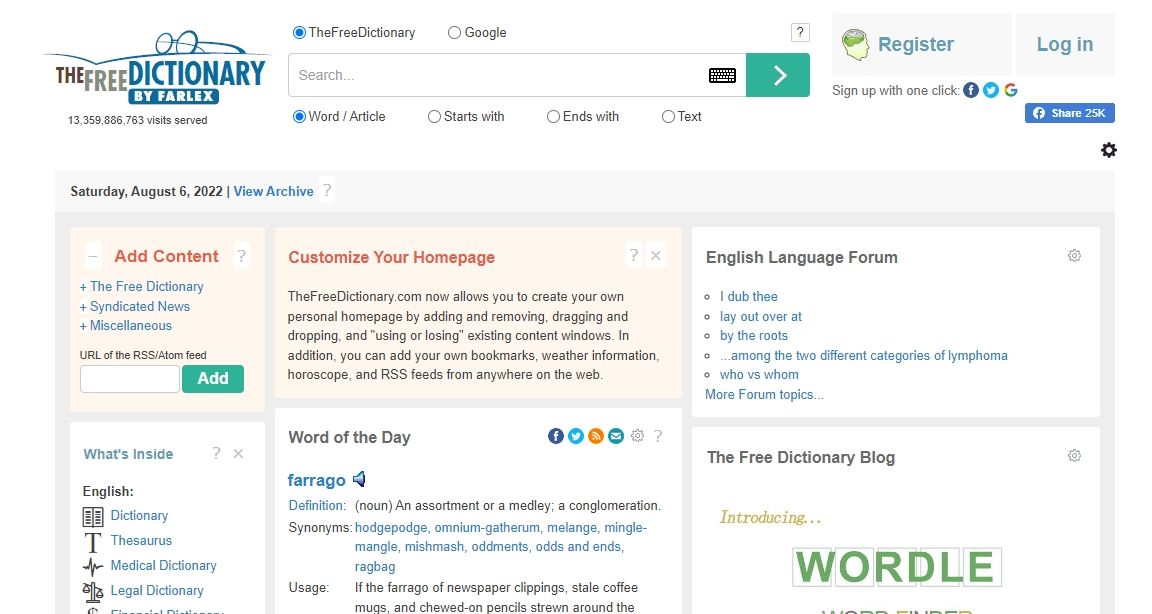
Get ready to learn a lot of things at The Free Dictionary site. It’s an awesome resource that has information categorized, helps you with definitions, spelling bee games and lots more. The site also features a start page where you can add your favorite modules and learn things new every day.
3. Visual Thesaurus
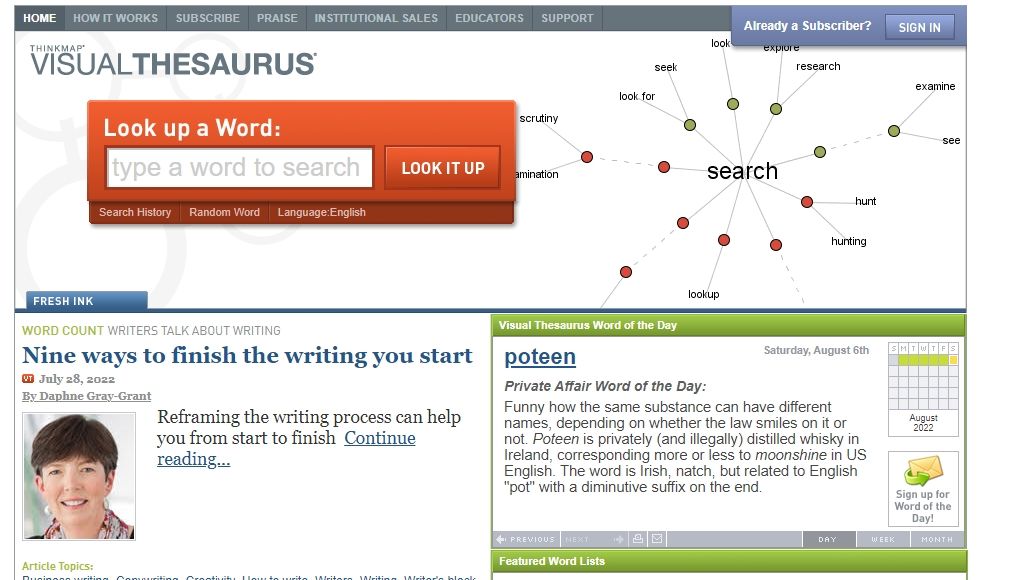
At Visual Thesaurus, you can have a great time exploring words and related terms and play around with them. It includes a pronunciation helper, so you need not worry about getting a word mispronounced.
Some other features include examples of usages and additional tips to prevent you from mistakenly using the wrong word. It’s available as a download and requires a subscription, costing $2.95 per month.
4. Google’s Define Operator
Since people have got used to googling for everything, it’s not a surprise that Google has included a little functionality to their search engine. If you want to know the meaning of a word, just type define: followed by the word in the Google search box, and get the definitions instantly on your screen. For example, define: intuitive.
Similarly, you can refer to our Google search cheat sheet for more operators and tips.
5. Howjsay
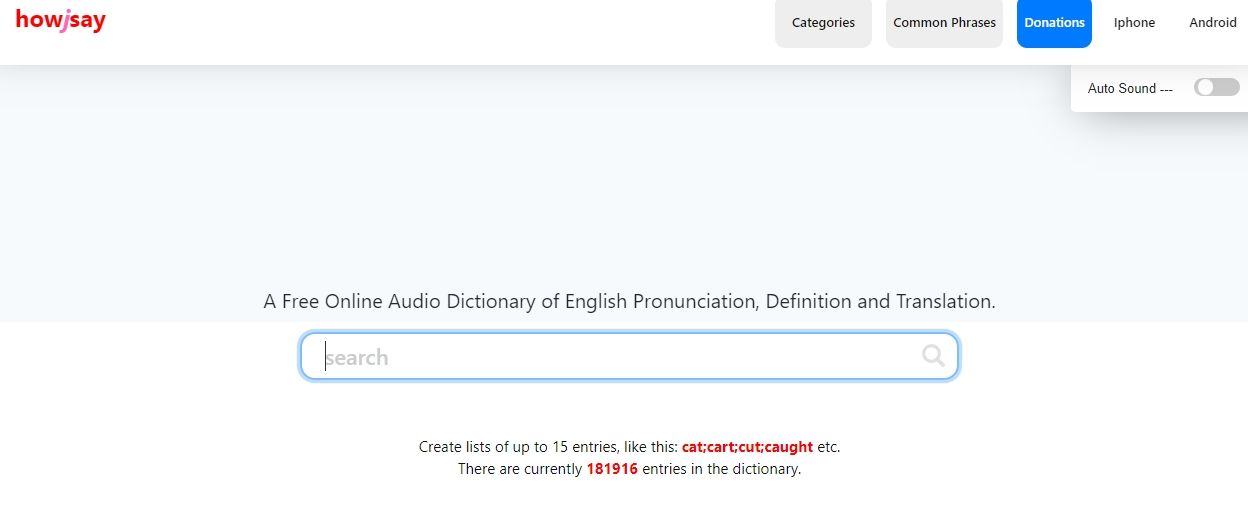
This is a handy audio dictionary, available on the web and as a mobile app. Just type in a word and get its definition or pronunciation immediately. It has a large database of words, divided into categories. This site is especially very useful for non-native speakers.
6. Merriam-Webster

Founded in 1828, Merriam-Webster is one of the most popular American dictionaries. Its website has an online dictionary, thesaurus, games, and quizzes. There are separate dictionaries for legal and medical terms. Merriam-Webster has mobile apps for improving vocabulary, in case you want to practice on the go.
7.Wordnik
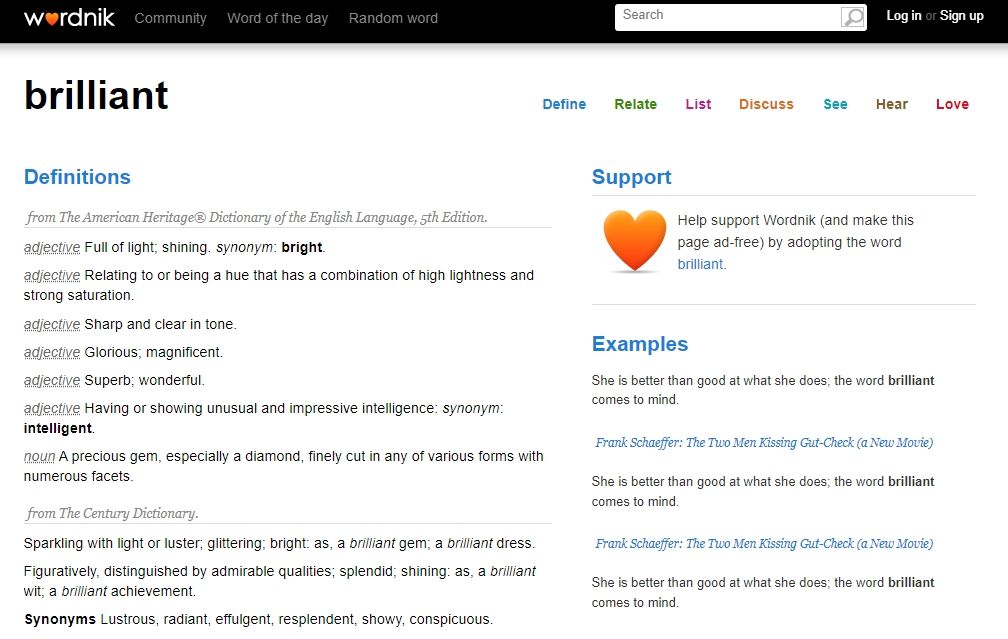
Wordnik is a non-profit organization and claims to have the largest collection of English words online. It isn’t a dictionary itself, but fetches meanings from numerous sources. It also displays the words related to the one you entered.
You can create your own word list on Wordnik and view random words to improve vocabulary. Wordnik is an extremely useful tool if you want to view the meaning of a single word from multiple sources simultaneously to compare or double-check.
Offline English Dictionaries
8. WordWeb
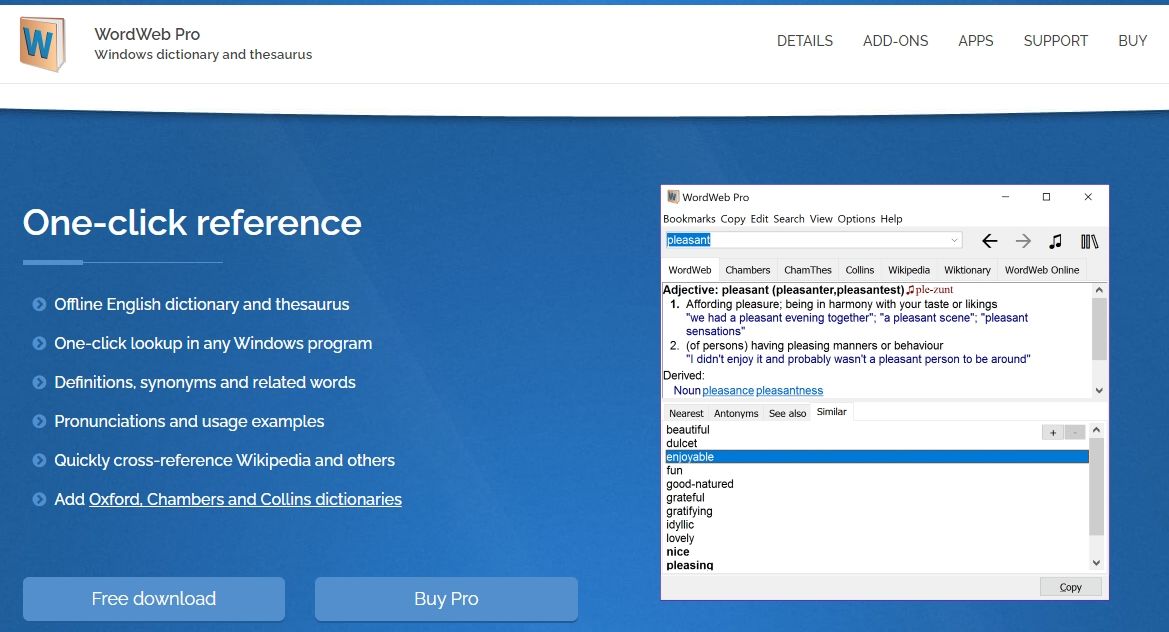
WordWeb functions as a dictionary tool that comes packed with the features you would expect in any dictionary. Select a word from any application and then press a shortcut to find out its meaning in WordWeb. Something you’ll love is the way its interface has been designed.
In case you need synonyms, related terms, etc., just click on the appropriate tab, and you’re done. The Pro version includes a few more capabilities, although the free version might be more than enough for your needs.
English Grammar Resources
9. BBC Learning English
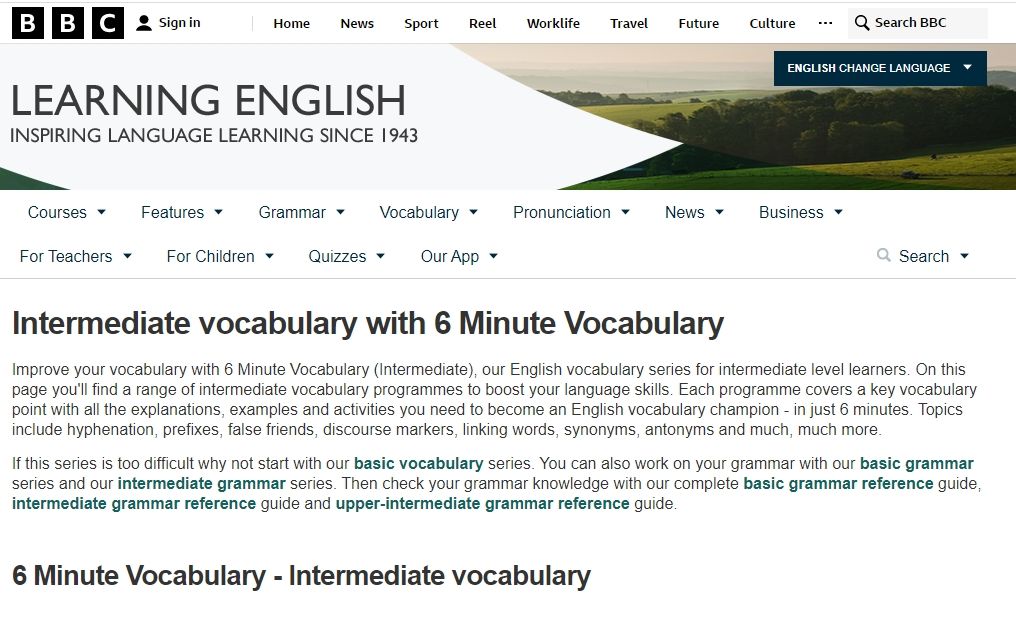
The BBC Learning English site has loads of information on English vocabulary and grammar, such as FAQs, exercises, and quizzes. The vocabulary section is divided into basic and intermediate level, depending on your proficiency. There are several activities in both these categories that take six minutes to complete.
If you still need more, you can test yourself in these quizzes:
- English Club Grammar Quizzes
- Britannica Grammar Quiz
- Grammar quizzes by Cambridge Dictionary
A Word a Day to Pick Up New English Vocabulary
The following sites are updated every day with words that you might have never heard of. You can see their origin, etymology, pronunciation, and a lot more. You can subscribe to their newsletters and spend less than a minute daily to enrich your English vocabulary,
10. A Word A Day by Wordsmith
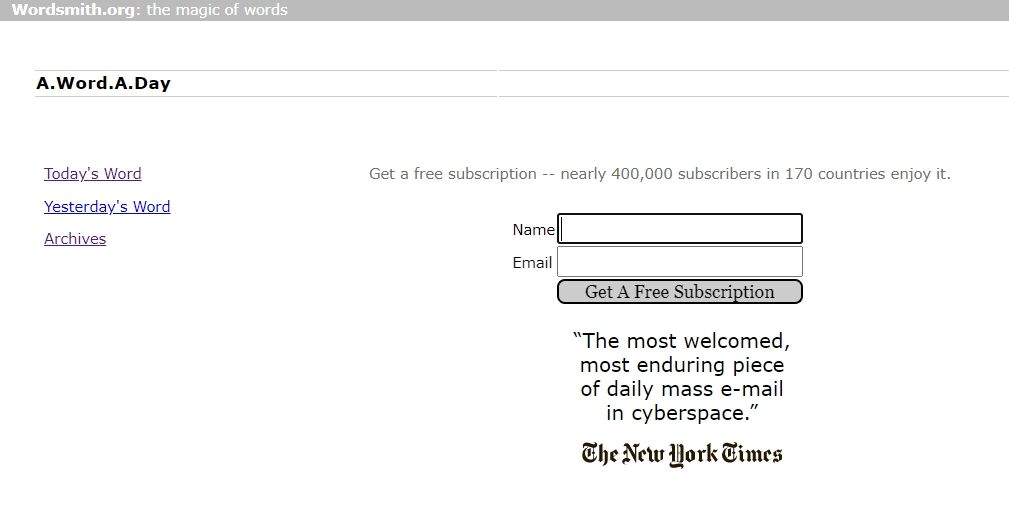
The newsletter shares a new word daily and has over 400,000 subscribers. You can subscribe to it for free and view archives.
11. The Word of the Day by The Britannica Dictionary

You can visit The Britannica Dictionary’s the Word of the Day page to learn a new word every day. It doesn’t have a newsletter, so you’ll have to bookmark it or view archives periodically. Besides this, it has quizzes and a list of the most common 3,000 words.
Podcasts
If you’re an auditory learner or doesn’t have much time to read, you can tune in to any of the several podcasts on English language.
12. Grammar Girl Podcast
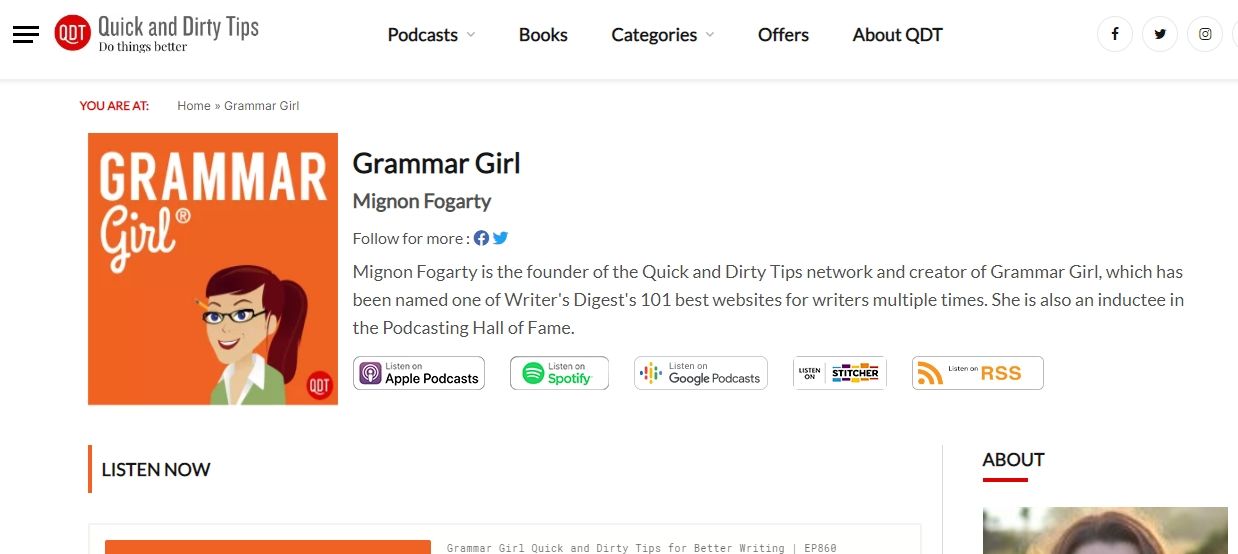
Hosted by Mignon Fogarty, Grammar Girl podcast aims to help you improve your writing. To that end, it discusses grammar, punctuation, and vocabulary.
English eBooks
13. Project Gutenberg
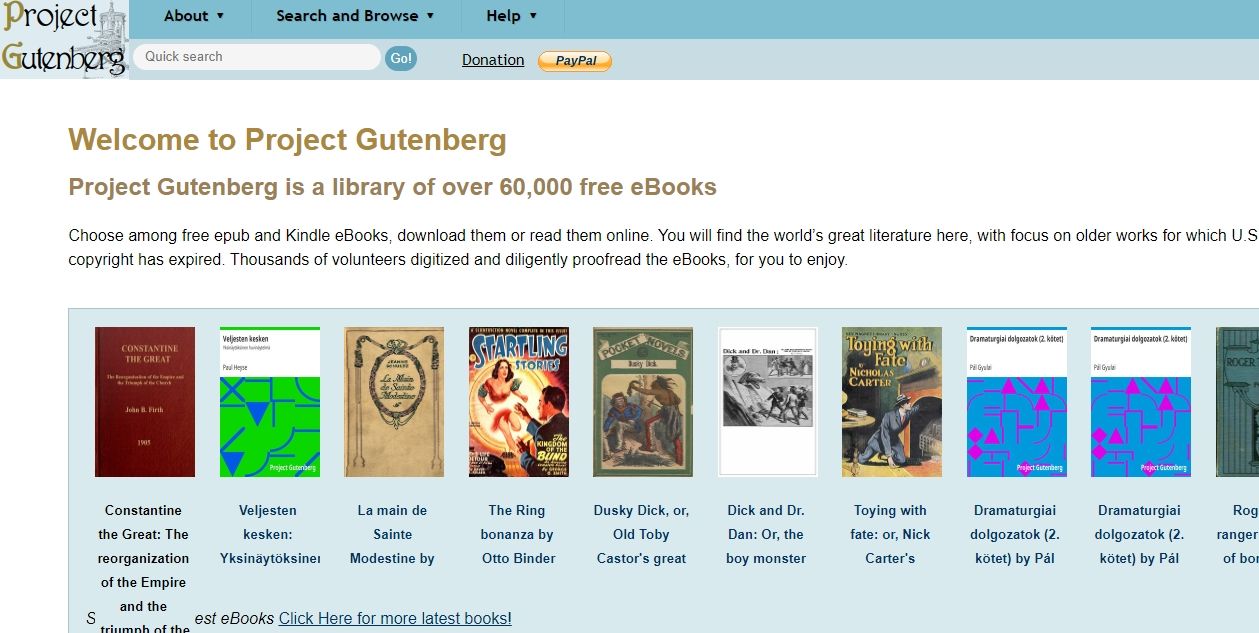
Project Gutenberg has over 60,000 free downloadable ebooks. These included dictionaries and books on English language. But reading books on other subjects is also a great way to improve vocabulary. Books from many languages are available, just take your pick from the online Gutenberg catalog.
Besides this, you can visit the other sites to find and download ebooks.
Educational Games
Looking for a fun way to learn? Try these games.
14. Chicago Tribune Jumble

Chicago Tribune has various fun activities on its sites, including scrambled word games called Jumble. They don’t take much time, are quite interesting, and help you learn new words.
15. Play Scrabble
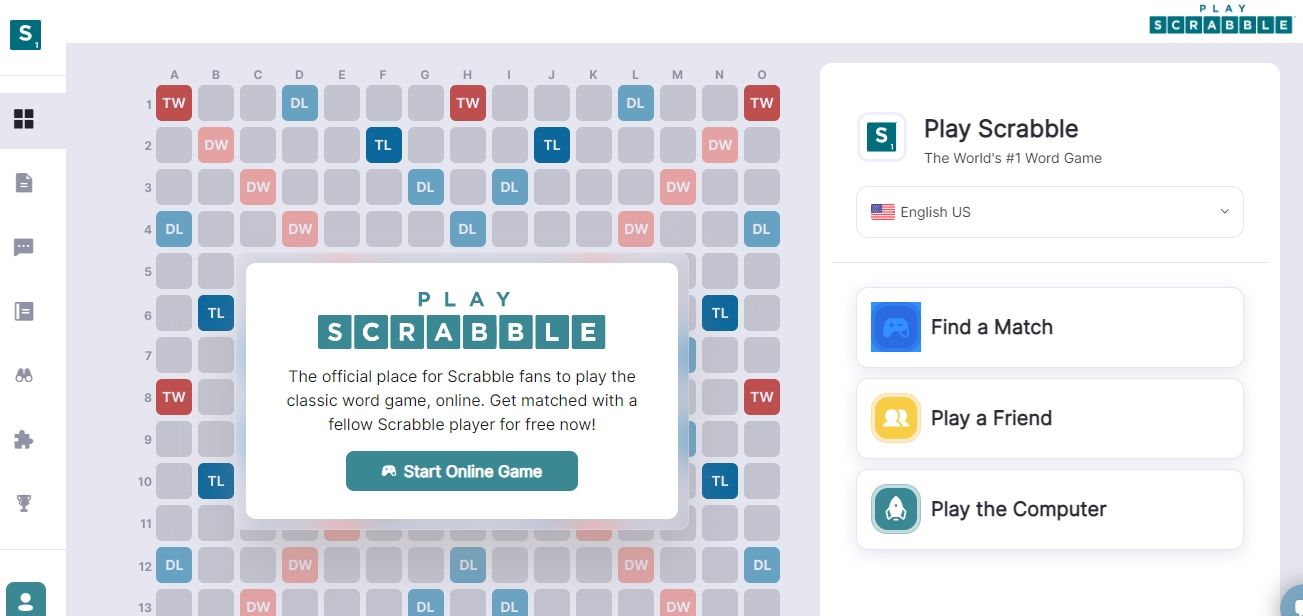
You can play scrabble on this site, either with the computer or other players. To make it more interesting, invite your friends.
16. ManyThings
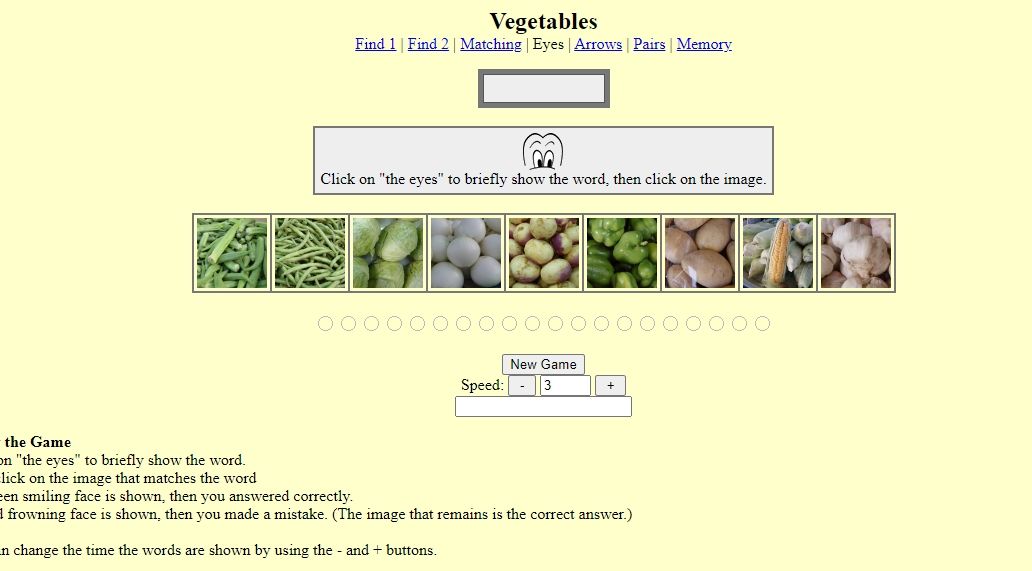
ManyThings has numerous vocabulary games and quizzes, including some pictorial games.
Blogs
There are countless blogs that provide tips on improving your English, like:
17. Daily Writing Tips
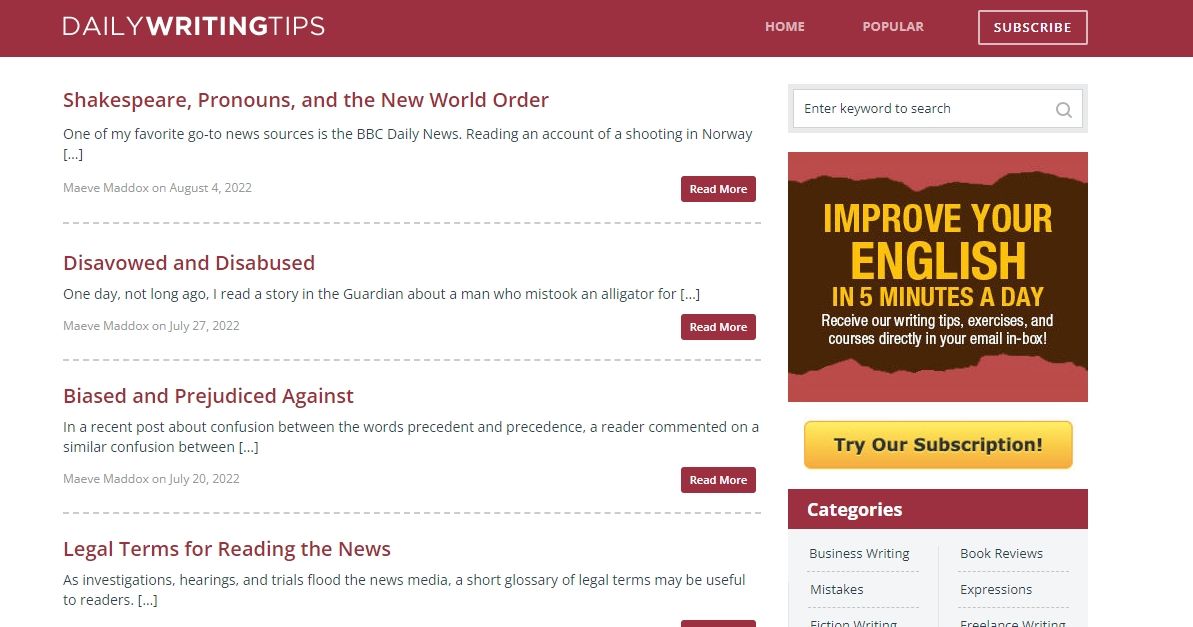
Daily Writing Tips covers all the aspects of writing, but you’ll find a ton of posts on vocabulary and word usage. You can view by category to find relevant posts.
Start Pages
These are quite great, and can save you loads of time. A Start Page is a page on the web that you can customize with stuff that you need to keep an eye on. For example, my start page contains modules that give me access to a few blogs, top news stories and weather.
18. Netvibes
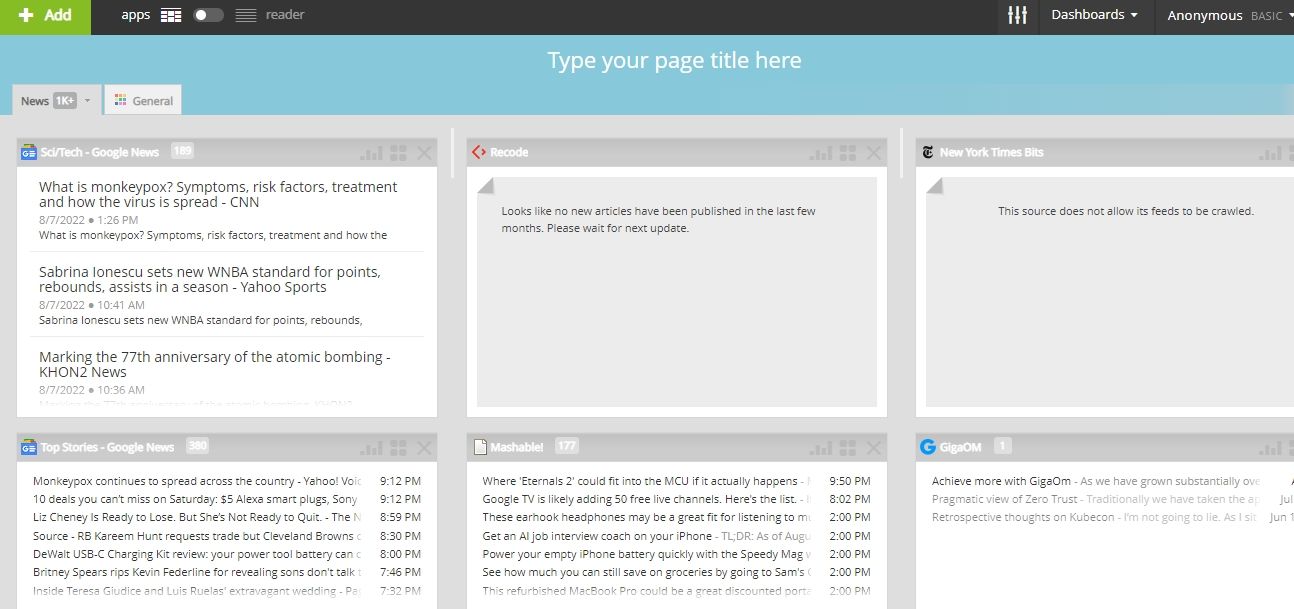
Using Netvibes, you can create a start page with modules like a dictionary, word a day stuff, etc. It offers a great deal of customization options, letting you add apps, feeds, and panels to your start page. Once you get used to them, these will not only help you to learn new words, but also track all the important information.
Learn New English Words Daily
Improving your vocabulary doesn’t have to be boring. Whether you like to play games or listen to podcasts, you can benefit from the above-mentioned online resources to learn new words.
Besides adding new words to your vocabulary, it’s essential to master your grammar. This, too, can be done with the help of sites and apps.

